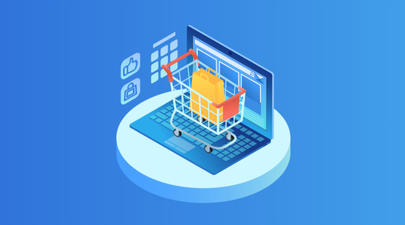This blog post is a comprehensive comparison of Shopify vs BigCommerce, two of the leading eCommerce platforms that have shaped the way businesses operate online. By understanding the evolution of eCommerce platforms and how Shopify and BigCommerce have developed to meet the demands of modern businesses, you will gain valuable insights into which platform might be the best fit for your online store.
Whether you’re a seasoned online retailer or just beginning your eCommerce journey, this comparison will help you navigate the key features, advantages, and limitations of Shopify vs BigCommerce, enabling you to make an informed decision that aligns with your business goals.
Table of Contents
Shopify vs BigCommerce: Overview
As businesses worldwide seek robust solutions to launch and manage their online stores, the debate of Shopify vs BigCommerce has become increasingly relevant. This blog post will offer an in-depth analysis of these two leading platforms, starting with an exploration of Shopify, including its background, market share, and user base.
Shopify
Shopify is a leading eCommerce platform that enables businesses of all sizes to create and manage their online stores with ease. Known for its user-friendly interface and robust features, Shopify powers over 1.7 million businesses worldwide.
What is Shopify?
Shopify is a leading eCommerce platform designed to enable businesses of all sizes to create, customize, and manage their online stores with ease. Launched in 2006, Shopify quickly became a game-changer in the eCommerce industry by offering a user-friendly, all-in-one solution for online retail. The platform caters to a wide range of users, from small businesses just starting out to large enterprises looking for a robust and scalable solution.

At its core, Shopify provides a flexible and intuitive interface that allows users to build their eCommerce websites without the need for extensive technical knowledge. The platform offers a variety of customizable templates, tools for product management, payment processing, and marketing, making it a one-stop-shop for online retailers. Whether you are selling physical products, digital goods, or services, Shopify provides the necessary infrastructure to run your business smoothly and efficiently.
One of Shopify’s key advantages is its extensive app ecosystem. The Shopify App Store offers thousands of apps that can be integrated into your store to enhance its functionality. These apps range from SEO tools and inventory management systems to social media integrations and customer service solutions. This flexibility allows businesses to tailor their online store to meet their specific needs and grow their operations seamlessly.
Basic Background Information
Shopify was founded by Tobias Lütke, Daniel Weinand, and Scott Lake in Ottawa, Canada. The trio originally set out to create an online store for snowboarding equipment but quickly realized that the available eCommerce solutions were inadequate for their needs. This led them to develop their own platform, which eventually became Shopify. Since its launch, Shopify has experienced exponential growth and has become one of the most popular eCommerce platforms worldwide.
The platform’s success can be attributed to its focus on user experience and its ability to adapt to the changing landscape of eCommerce. Shopify has continuously evolved, introducing new features and integrations that keep it at the forefront of the industry. From its humble beginnings as a tool for small businesses to its current status as a leading enterprise solution, Shopify’s journey reflects its commitment to innovation and customer satisfaction.
In addition to its core eCommerce capabilities, Shopify has expanded its offerings to include solutions for point-of-sale (POS) systems, payment processing, and even physical retail spaces. This holistic approach has allowed Shopify to cater to a wide range of business models, making it a versatile choice for online retailers.
Market Share and User Base
When comparing Shopify vs BigCommerce, one of the most significant factors to consider is market share and user base. Shopify has established itself as a dominant force in the eCommerce industry, powering over 1.7 million businesses across more than 175 countries. This impressive reach underscores Shopify’s global appeal and its ability to support businesses in diverse markets.
Shopify’s market share has steadily increased over the years, particularly in the small and medium-sized business (SMB) segment. The platform’s ease of use, affordability, and scalability make it an attractive option for entrepreneurs and growing businesses. However, Shopify’s appeal isn’t limited to SMBs; many large enterprises also rely on Shopify to manage their online operations, thanks to its robust features and ability to handle high traffic volumes and large inventories.
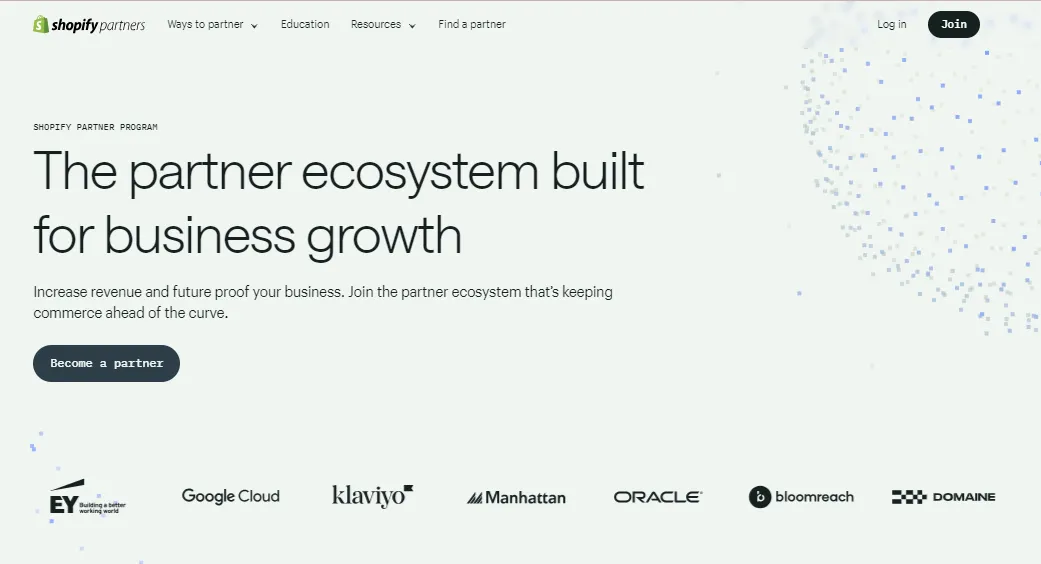
In terms of user base, Shopify’s flexibility allows it to serve a wide range of industries, including fashion, electronics, beauty, and more. The platform is particularly popular among direct-to-consumer (DTC) brands, which benefit from Shopify’s strong focus on customer experience and its extensive marketing tools. Shopify’s user community is diverse, ranging from solo entrepreneurs to multinational corporations, all of whom rely on the platform to drive their eCommerce success.
Shopify’s popularity is further evidenced by its growing ecosystem of developers, designers, and partners who contribute to the platform’s ongoing innovation. The Shopify Partner Program, for example, allows agencies and freelancers to offer their services to Shopify merchants, creating a vibrant marketplace of solutions and expertise. This community-driven approach has helped Shopify maintain its competitive edge and continue to attract new users.
As we continue to explore the Shopify vs BigCommerce comparison, it’s clear that Shopify’s market share and user base are key indicators of its success and influence in the eCommerce industry. Understanding these factors is essential for businesses looking to choose the right platform for their online store.
BigCommerce
BigCommerce is a leading eCommerce platform known for its flexibility and scalability, making it an ideal choice for businesses of all sizes. With a focus on providing advanced features and customization options, BigCommerce is designed to support complex online stores and help them grow rapidly.
What is BigCommerce?
BigCommerce is a powerful eCommerce platform designed to support businesses of all sizes in creating, managing, and scaling their online stores. Known for its robust set of features, BigCommerce provides a flexible and highly customizable environment that caters to the diverse needs of online retailers. The platform is particularly well-regarded for its ability to handle complex catalogs and high volumes of traffic, making it a preferred choice for businesses looking to scale rapidly.
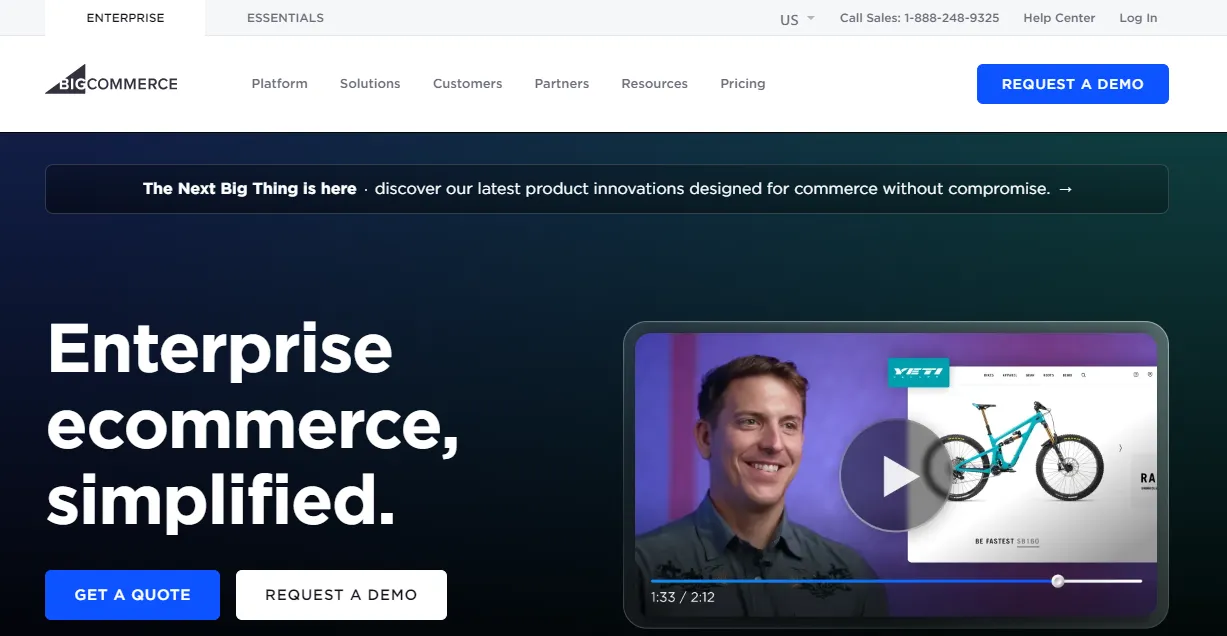
One of the standout features of BigCommerce is its open SaaS (Software as a Service) architecture, which allows businesses to take advantage of the platform’s hosted services while also offering the flexibility to customize and integrate with various third-party applications. This hybrid approach gives businesses the best of both worlds—ease of use and control over their online store’s functionality.
BigCommerce also excels in providing built-in SEO tools, advanced product management features, and a wide array of integrations with popular software, including CRM systems, ERPs, and marketing tools. This makes it a comprehensive solution for businesses that require more than just a basic online storefront. Whether you’re a small startup or a large enterprise, BigCommerce is designed to grow with your business, offering scalability and performance that can handle the demands of any eCommerce operation.
Basic Background Information
BigCommerce was founded in 2009 by Eddie Machaalani and Mitchell Harper in Sydney, Australia. The platform was created with the goal of providing businesses with a more robust and customizable alternative to existing eCommerce solutions. Since its inception, BigCommerce has grown rapidly, expanding its operations globally and establishing itself as a major player in the eCommerce industry.
The platform’s growth has been fueled by its focus on innovation and customer-centric development. Over the years, BigCommerce has introduced a variety of features aimed at addressing the specific needs of online retailers, from multi-channel selling capabilities to advanced analytics and reporting tools. This continuous evolution has helped BigCommerce stay competitive in a market that is constantly changing.
In addition to its core eCommerce offerings, BigCommerce has also made strategic partnerships with major technology companies like Google, Amazon, and Facebook. These partnerships have enabled BigCommerce to integrate seamlessly with some of the most popular digital marketing and sales channels, providing its users with the tools they need to reach a wider audience and increase their sales.
As of today, BigCommerce has offices in Austin, Texas; San Francisco, California; and Sydney, Australia, among other locations. The company’s global presence and commitment to innovation have solidified its position as a leading eCommerce platform, trusted by thousands of businesses worldwide.
Market Share and User Base
When examining the Shopify vs BigCommerce debate, understanding the market share and user base of each platform is crucial. BigCommerce, while not as large as Shopify in terms of market share, has carved out a significant niche in the eCommerce industry, particularly among businesses that require a highly customizable and scalable solution.
BigCommerce powers thousands of online stores in over 150 countries, serving a diverse range of industries, including fashion, electronics, health and beauty, and more. The platform is especially popular among mid-market and enterprise-level businesses that need advanced features and the ability to handle large product catalogs and high traffic volumes.
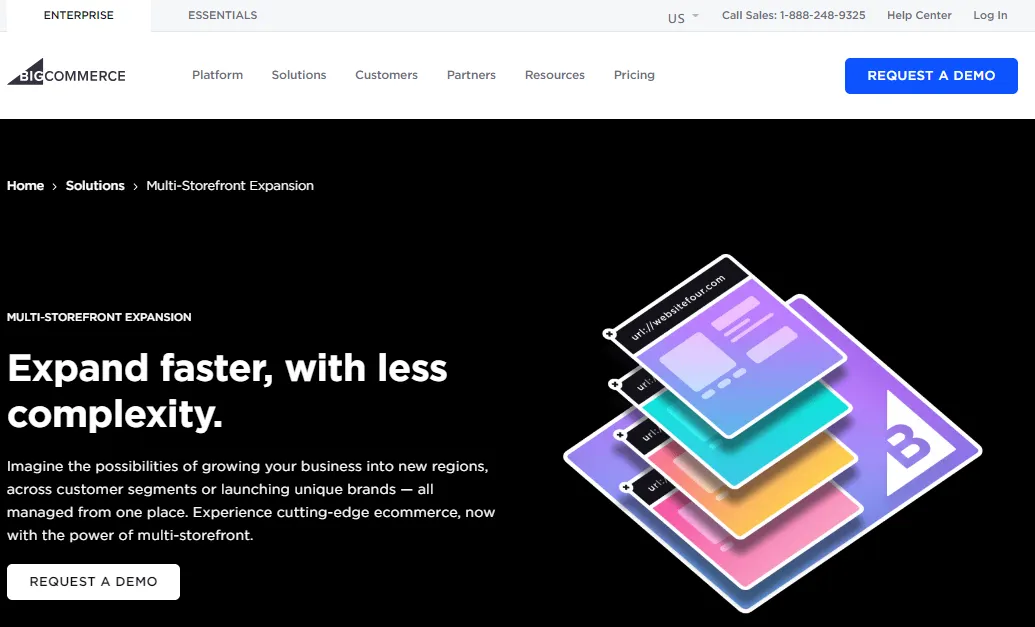
One of the reasons BigCommerce has gained traction among larger businesses is its strong focus on performance and scalability. The platform is built to support complex eCommerce operations, offering features like faceted search, advanced product filtering, and enterprise-grade security. This makes it an attractive option for businesses that anticipate rapid growth and need a platform that can scale alongside them.
In terms of market share, BigCommerce is often considered a top competitor to Shopify, particularly in the mid-market and enterprise segments. While Shopify has a larger overall user base, BigCommerce’s focus on providing a highly customizable and scalable platform has helped it attract a loyal following of businesses that require more advanced capabilities than what is typically offered by other SaaS eCommerce platforms.
BigCommerce’s user base includes a mix of small businesses, mid-market companies, and large enterprises. The platform’s flexibility and robust feature set make it suitable for a wide range of industries, and its ability to integrate with various third-party systems has made it a preferred choice for businesses that need a tailored eCommerce solution.
As we continue to explore the Shopify vs BigCommerce comparison, it becomes clear that BigCommerce’s market share and user base are reflective of its strengths as a platform. For businesses that require a powerful, customizable, and scalable eCommerce solution, BigCommerce offers a compelling alternative to Shopify, making it a key player in the ongoing debate between these two leading platforms.
Shopify vs BigCommerce: Detailed Comparison
Both Shopify and BigCommerce are powerful eCommerce platforms, but they differ in how they handle crucial aspects of online business management.
Core eCommerce Features
In the eCommerce industry, the success of an online business often hinges on the platform it chooses to operate on. Shopify and BigCommerce are two of the most robust eCommerce platforms available, each offering a wide array of features designed to cater to businesses of all sizes. In this detailed comparison, we’ll explore the core eCommerce features of Shopify vs BigCommerce.
Product Management (SKUs, Variants, and Inventory)
Shopify
Shopify offers a user-friendly approach to product management, making it easy for businesses to add, organize, and manage their inventory. The platform allows merchants to create and manage products with multiple SKUs (Stock Keeping Units) and variants, such as different sizes, colors, or materials. Shopify’s interface simplifies the process of adding these variants, ensuring that even those with limited technical knowledge can efficiently manage their product catalog.
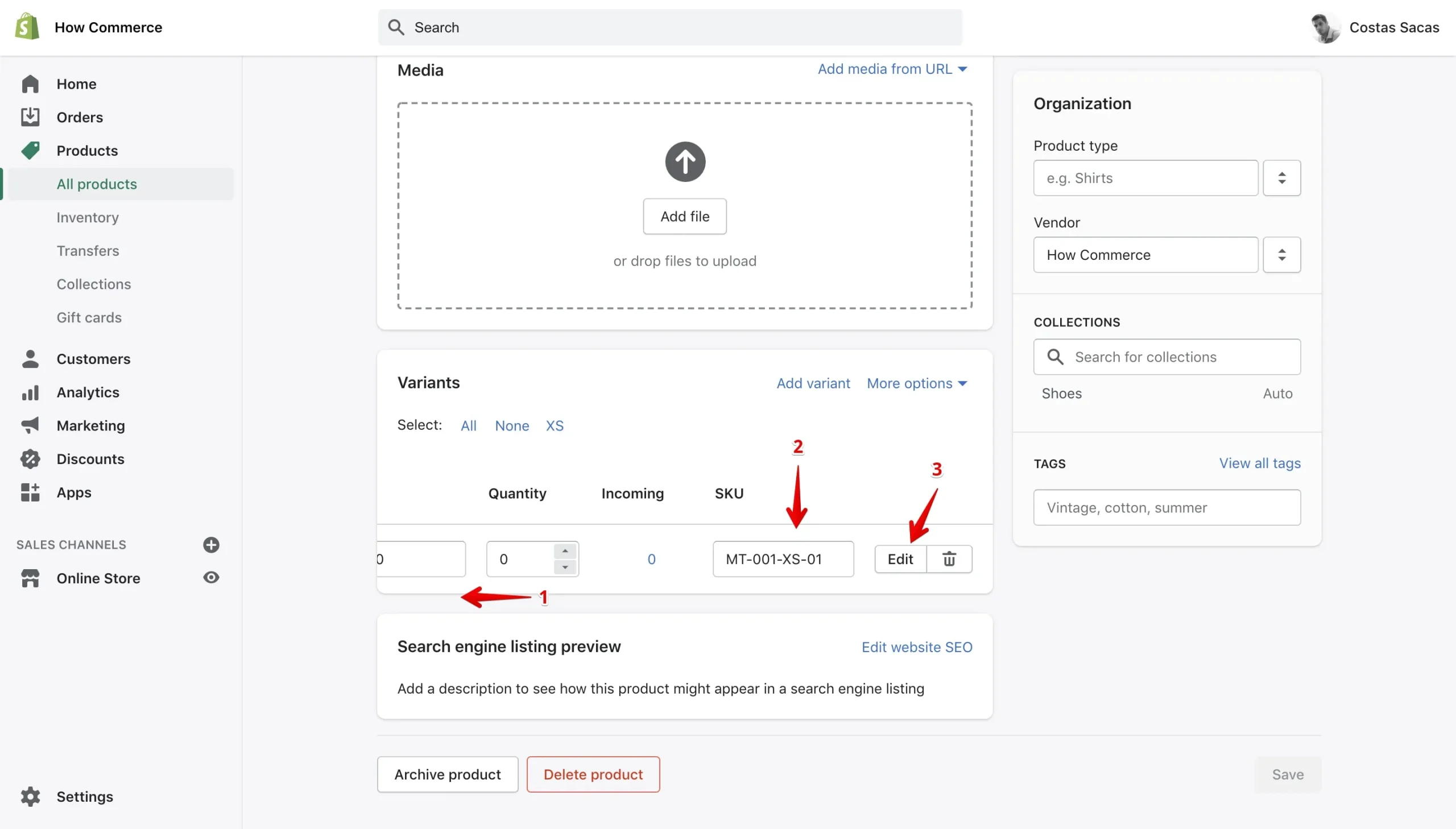
Inventory management on Shopify is equally straightforward. The platform provides real-time inventory tracking, enabling businesses to keep tabs on stock levels across multiple locations. Merchants can set up alerts to notify them when inventory is low, helping to prevent stockouts and ensure that popular items are always available to customers. Additionally, Shopify’s bulk product editing tool allows for quick adjustments to inventory details, making it easier to manage large catalogs.
BigCommerce
BigCommerce also excels in product management, offering advanced features that cater to businesses with complex product catalogs. Like Shopify, BigCommerce supports multiple SKUs and product variants, but it goes a step further by providing more granular control over product options and attributes. For example, merchants can create unlimited product variants with specific pricing, images, and SKU codes for each variant, making it ideal for businesses with highly customizable products.
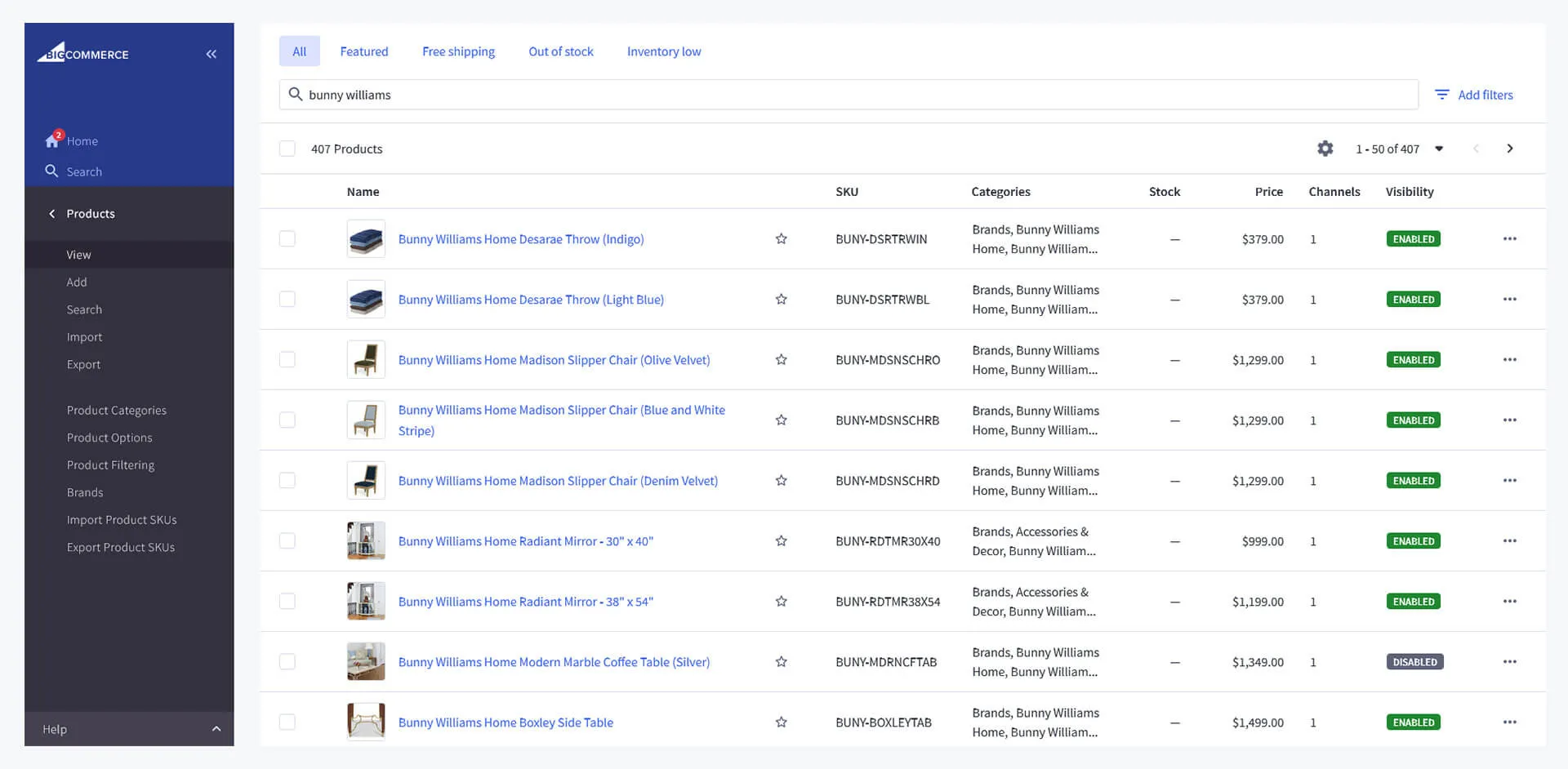
Inventory management on BigCommerce is comprehensive, offering real-time updates and the ability to manage stock across multiple channels and locations. BigCommerce’s inventory control is particularly robust, allowing businesses to track inventory at the product option level, ensuring accurate stock counts even for products with multiple variants. Additionally, BigCommerce provides advanced inventory rules, such as automatically updating stock levels when orders are placed or canceled, which can help streamline operations and reduce manual work.
Shopify vs BigCommerce
In terms of product management, BigCommerce offers more advanced features for businesses with complex product catalogs and extensive variant needs. However, Shopify’s ease of use and streamlined interface make it an excellent choice for businesses that prioritize simplicity and efficiency in managing their inventory.
Order Management and Fulfillment
Shopify
Order management is a critical aspect of running a successful eCommerce business, and Shopify provides a robust system to handle this. Shopify’s order management features include the ability to view, track, and manage all orders from a single dashboard. Merchants can easily update order statuses, process returns, and issue refunds directly from the platform. Shopify also integrates seamlessly with various third-party fulfillment services, allowing businesses to automate the fulfillment process and reduce manual intervention.
Shopify’s built-in order fulfillment capabilities are complemented by its support for dropshipping, making it easier for businesses to sell products without maintaining their own inventory. The platform also supports partial fulfillment, enabling merchants to fulfill parts of an order as stock becomes available, which is particularly useful for businesses that manage multiple warehouses or have products on backorder.
BigCommerce
BigCommerce offers a highly flexible order management system designed to accommodate businesses of all sizes. The platform provides a centralized dashboard where merchants can manage orders, process returns, and issue refunds. BigCommerce’s order management system is built to handle high volumes of transactions, making it suitable for growing businesses and enterprises with a large customer base.
One of the standout features of BigCommerce’s order management is its ability to automate complex fulfillment workflows. For example, merchants can set up rules to automatically route orders to the nearest fulfillment center or prioritize certain shipping methods based on order criteria. BigCommerce also integrates with leading third-party logistics providers and dropshipping platforms, allowing businesses to streamline their fulfillment processes and scale efficiently.
Shopify vs BigCommerce
In the comparison for order management and fulfillment, both platforms offer robust solutions. However, BigCommerce provides more advanced automation options and flexibility, making it a better fit for businesses with complex order fulfillment needs. Shopify, on the other hand, is more user-friendly and integrates well with various fulfillment services, making it ideal for businesses that prefer a simpler, more straightforward approach.
Payment Gateways and Processing Fees
Shopify
Shopify supports a wide range of third-party payment gateways, including its own payment processor, Shopify Payments. By using Shopify Payments, merchants can avoid additional transaction fees, making it a cost-effective option for many businesses. Shopify Payments supports multiple currencies and payment methods, including credit cards, Apple Pay, and Google Pay, providing customers with a seamless checkout experience.
For businesses that prefer to use third-party payment processors, Shopify integrates with over 100 payment gateways globally. However, it’s important to note that using a third-party gateway may incur additional transaction fees on top of the standard credit card processing fees. Shopify also offers a robust set of tools for managing payments, including fraud analysis, secure payment processing, and the ability to set custom payment methods.
BigCommerce
BigCommerce also supports a wide range of payment gateways, including PayPal, Stripe, Square, and Amazon Pay. Unlike Shopify, BigCommerce does not charge additional transaction fees for using third-party payment processors, which can result in significant cost savings for businesses with high sales volumes. This makes BigCommerce an attractive option for businesses that want the flexibility to choose their preferred payment gateway without incurring extra fees.
BigCommerce offers advanced payment features, such as multi-currency support, custom payment methods, and secure checkout options. The platform also provides tools for managing recurring billing and subscriptions, which can be particularly beneficial for businesses that operate on a subscription model. Additionally, BigCommerce’s payment gateway integrations are designed to be fast and easy to set up, minimizing downtime and ensuring a smooth customer experience.
Shopify vs BigCommerce
When it comes to payment gateways and processing fees, the comparison reveals that BigCommerce offers more flexibility and cost savings, especially for businesses that prefer to use third-party payment processors. Shopify’s integration with its own payment processor is convenient and user-friendly, but the additional transaction fees for using other gateways can be a drawback for some businesses.
Shipping and Tax Options
Shopify
Shopify offers a comprehensive suite of shipping and tax options that cater to businesses of all sizes. The platform allows merchants to set up custom shipping rates based on location, weight, and order value. Shopify also integrates with major shipping carriers, such as USPS, UPS, and DHL, allowing businesses to offer real-time shipping rates at checkout. For businesses that handle their own shipping, Shopify provides tools to print shipping labels, track shipments, and manage returns.
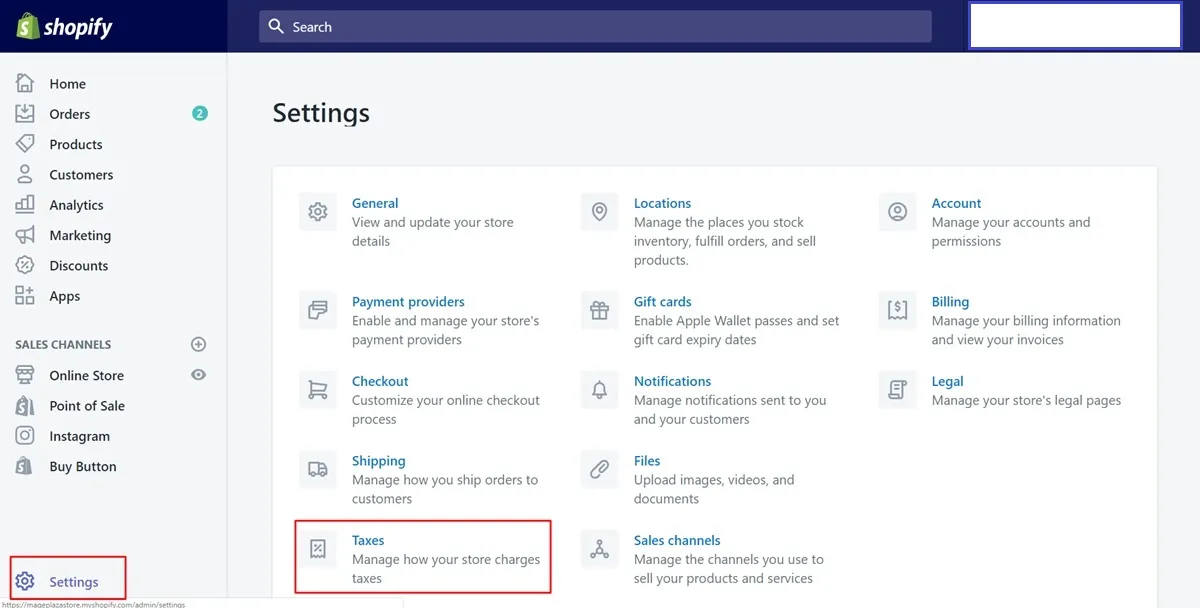
Tax management on Shopify is equally robust, with automated tax calculations based on the customer’s location. The platform supports both national and international tax rules, making it easier for businesses to comply with tax regulations in different regions. Shopify also offers the ability to set custom tax rates, apply tax overrides, and manage tax exemptions, providing flexibility for businesses with specific tax requirements.
BigCommerce
BigCommerce provides advanced shipping and tax features that are designed to meet the needs of both small businesses and large enterprises. The platform offers flexible shipping options, including real-time carrier quotes, custom shipping rules, and multi-location shipping. BigCommerce integrates with leading shipping carriers, enabling businesses to provide accurate shipping rates and delivery times at checkout. The platform also supports in-store pickup and local delivery options, making it a versatile solution for businesses with both online and physical retail operations.
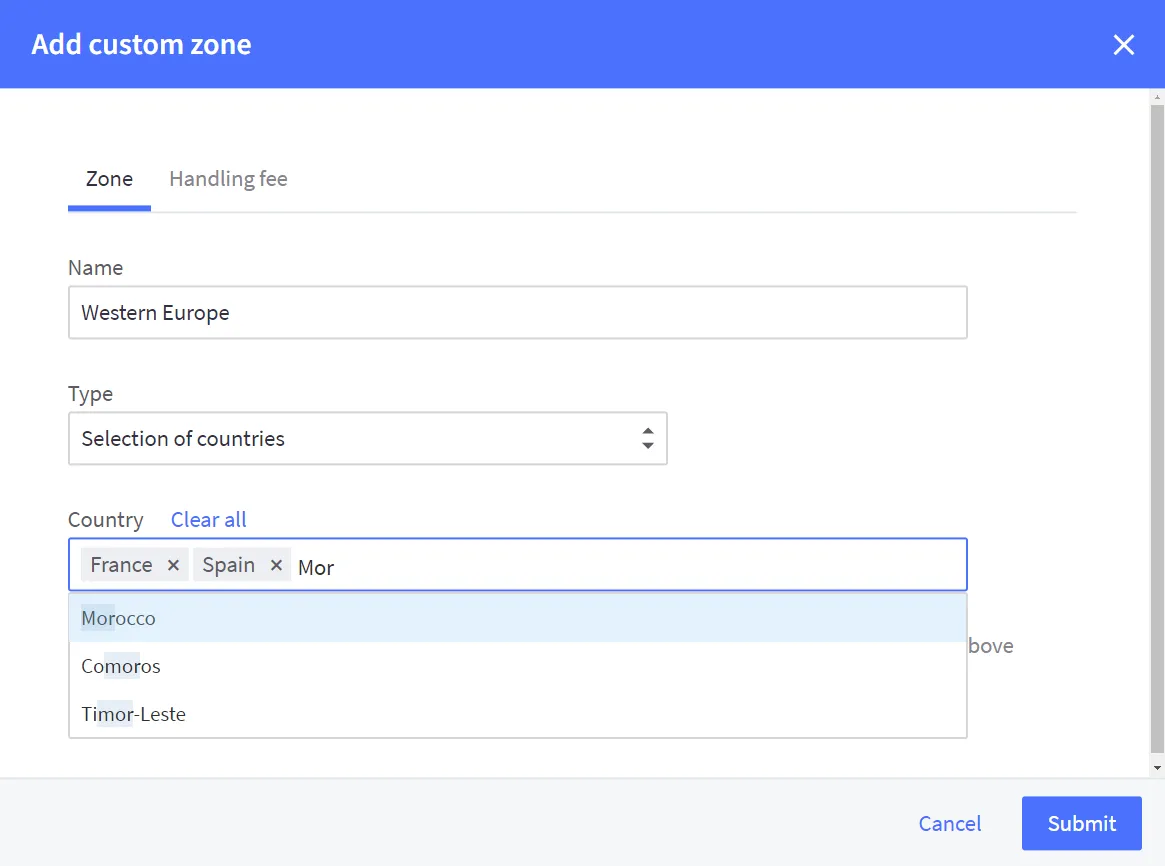
Tax management on BigCommerce is highly customizable, with support for automatic tax calculations based on the customer’s location. The platform integrates with leading tax software providers, such as Avalara, to ensure accurate tax compliance across different jurisdictions. BigCommerce also allows merchants to create custom tax rules, apply tax exemptions, and manage complex tax scenarios, making it a powerful tool for businesses with diverse tax needs.
Shopify vs BigCommerce
In this comparison for shipping and tax options, both platforms offer comprehensive solutions, but BigCommerce provides more advanced customization and flexibility. Shopify’s ease of use and integration with major carriers make it a solid choice for businesses with straightforward shipping and tax needs, while BigCommerce’s advanced features cater to businesses with more complex requirements.
Multi-Channel Selling (Online Store, Social Media, Marketplaces)
Shopify
Shopify is known for its strong multi-channel selling capabilities, allowing businesses to sell across various platforms, including their online store, social media, and marketplaces. Shopify’s multi-channel integration is seamless, enabling merchants to manage all their sales channels from a single dashboard. The platform supports sales on popular social media platforms like Facebook, Instagram, and Pinterest, making it easy for businesses to reach customers where they spend their time.
In addition to social media, Shopify integrates with major online marketplaces like Amazon and eBay. This integration allows businesses to sync their inventory, manage orders, and track sales across multiple channels, all within the Shopify platform. Shopify also offers a POS system that integrates with the online store, enabling businesses to sell in physical locations and keep their inventory and sales data unified.
BigCommerce
BigCommerce also offers robust multi-channel selling features, allowing businesses to expand their reach across various platforms. The platform integrates with major social media platforms, including Facebook, Instagram, and Pinterest, enabling businesses to sell directly through social media. BigCommerce also supports sales on leading marketplaces like Amazon, eBay, and Walmart, providing businesses with the tools they need to manage their multi-channel operations efficiently.
One of BigCommerce’s strengths in multi-channel selling is its ability to handle complex catalog management and pricing across different channels. The platform allows businesses to create channel-specific pricing, promotions, and inventory rules, making it particularly useful for businesses that need to maintain consistency and control across multiple sales channels. BigCommerce’s centralized dashboard ensures that all sales, whether from an online store, social media, or marketplaces, are synchronized, helping businesses maintain accurate inventory levels and order management across all platforms.
Shopify vs BigCommerce
In the realm of multi-channel selling, the comparison reveals that both platforms offer strong capabilities, but they cater to slightly different needs. Shopify excels in providing seamless integration across a wide range of social media platforms and marketplaces, making it a great choice for businesses looking for a straightforward way to manage multi-channel sales. BigCommerce, on the other hand, offers more advanced control and customization, which is ideal for businesses with complex multi-channel strategies that require precise management of pricing, promotions, and inventory across various sales channels.
Customization and Design
When choosing an eCommerce platform, customization and design are pivotal elements that can significantly impact the look, feel, and functionality of an online store. Both Shopify and BigCommerce offer robust customization options, but they differ in how they approach design flexibility and user experience.
Theme Availability and Quality
Shopify
Shopify is well-known for its extensive collection of high-quality themes, designed to cater to a variety of industries and business needs. The Shopify Theme Store offers over 70 professionally designed themes, with a mix of free and premium options. These themes are created by experienced designers and are optimized for aesthetics and functionality, ensuring that even businesses with limited design expertise can create a visually appealing online store.
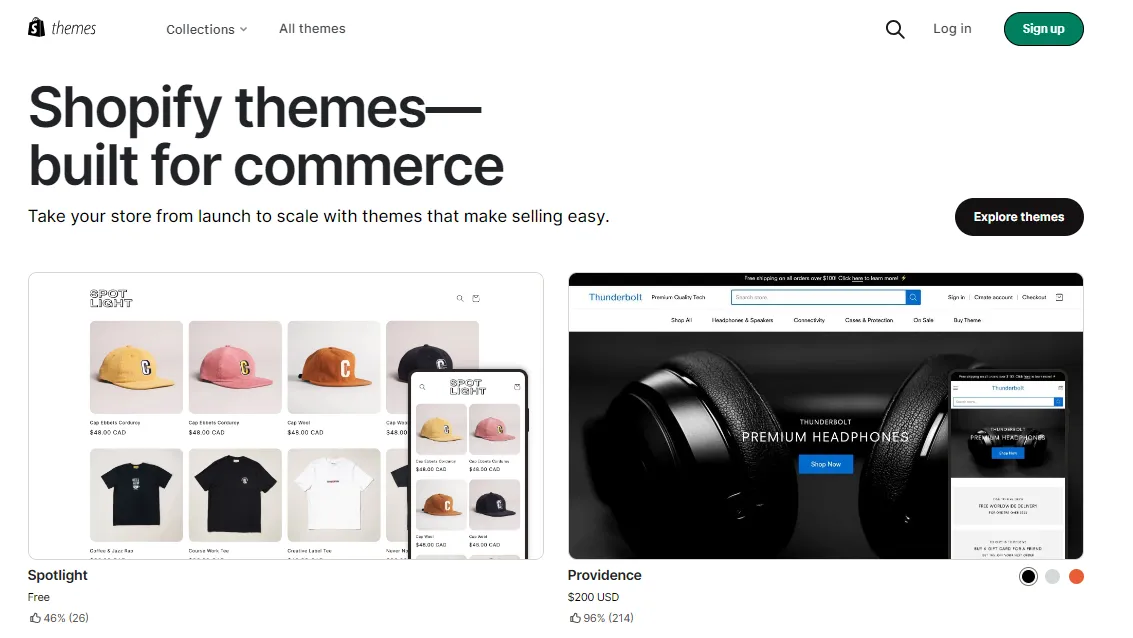
One of Shopify’s key strengths is the quality and polish of its themes. Each theme is built to be highly customizable, allowing businesses to adjust colors, fonts, and layouts to match their brand identity. Shopify themes are also known for their clean, modern design and responsiveness, ensuring that stores look great on both desktop and mobile devices. Additionally, Shopify themes are SEO-friendly, with built-in features that help improve search engine rankings, which is crucial for driving organic traffic.
BigCommerce
BigCommerce offers a range of themes through its Theme Marketplace, with a focus on providing modern, responsive designs that can be easily customized. While BigCommerce’s theme selection is smaller compared to Shopify, with around 150 themes available, it includes both free and premium options that are designed to cater to different business sizes and industries.
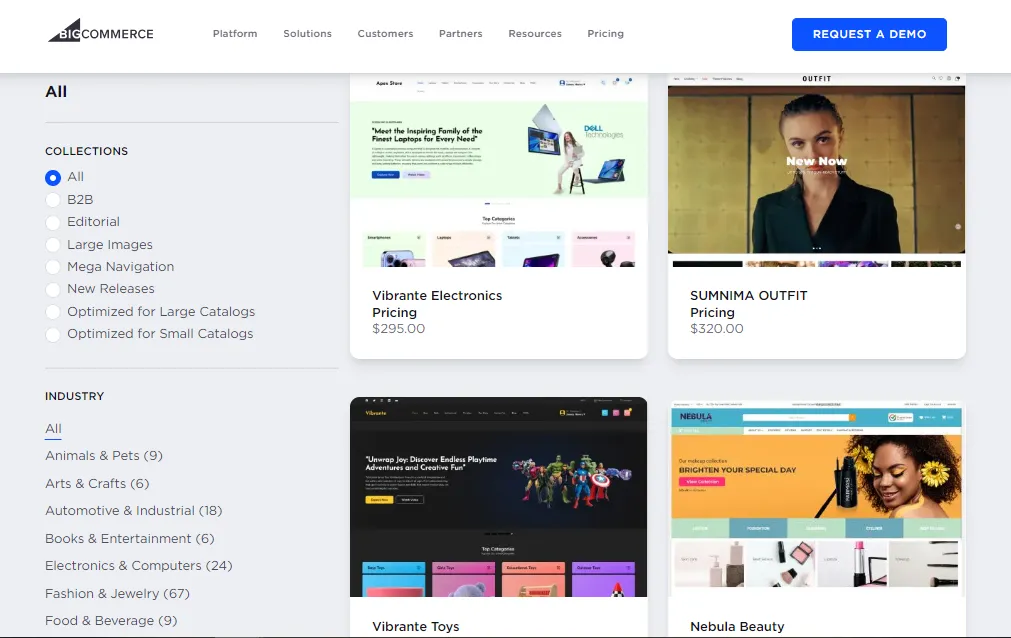
BigCommerce themes are built with a focus on performance and conversion optimization. The themes are designed to load quickly, which is essential for maintaining a good user experience and reducing bounce rates. Additionally, BigCommerce themes are fully responsive, ensuring that your store looks and functions well on all devices. The platform also offers themes specifically optimized for different types of products, such as fashion, electronics, and home goods, allowing businesses to choose a theme that best suits their product offerings.
Shopify vs BigCommerce
In the comparison regarding theme availability and quality, Shopify offers a broader selection of themes with a strong emphasis on aesthetics and user experience. BigCommerce, while offering fewer themes, focuses on performance and conversion optimization, making it a great choice for businesses that prioritize speed and functionality. Ultimately, Shopify’s extensive and polished theme collection gives it an edge for businesses looking for a wide variety of design options.
Customization Flexibility (Coding and No-Code Options)
Shopify
Shopify provides a balanced approach to customization, catering to both non-technical users and developers. For those who prefer not to code, Shopify’s intuitive drag-and-drop editor allows users to customize their store’s layout, colors, and content without needing any technical expertise. This no-code option makes it easy for beginners to create and modify their store’s design, ensuring that they can achieve a professional look with minimal effort.
For more advanced users, Shopify offers extensive customization capabilities through its proprietary templating language, Liquid. Developers can use Liquid to make deep customizations to the store’s theme, such as adding custom sections, modifying templates, and integrating third-party applications. Shopify also provides access to the theme’s CSS and JavaScript, allowing developers to create a truly unique and tailored shopping experience.
Additionally, Shopify’s app ecosystem plays a significant role in customization. With thousands of apps available in the Shopify App Store, businesses can easily add new features and functionalities to their store, ranging from advanced product filters to custom checkout experiences.
BigCommerce
BigCommerce offers robust customization options that cater to both non-technical users and developers looking for more control over their store’s design. The platform’s Stencil theme framework is designed for flexibility, allowing users to customize their store’s appearance using the intuitive Page Builder tool. This drag-and-drop tool enables users to make real-time changes to their store’s design, such as adding banners, rearranging sections, and adjusting layouts, all without needing to write a single line of code.
For developers, BigCommerce provides powerful customization capabilities through its Stencil CLI, which allows for advanced theme customization using HTML, CSS, and JavaScript. Developers can create custom themes from scratch or modify existing themes to meet specific business requirements. BigCommerce also supports custom checkout experiences and integrates with third-party tools via its open API, giving developers the flexibility to build complex, customized eCommerce solutions.
Shopify vs BigCommerce
When comparing Shopify vs BigCommerce in terms of customization flexibility, both platforms offer strong no-code options for beginners and extensive coding capabilities for developers. Shopify’s Liquid templating language provides powerful customization options, while BigCommerce’s Stencil framework and open API offer a high degree of flexibility for developers. Businesses looking for a balance between ease of use and advanced customization will find that both platforms cater to their needs, with Shopify being slightly more accessible for beginners and BigCommerce offering more robust tools for developers.
Mobile Responsiveness and Optimization
Shopify
In today’s mobile-first world, having a fully responsive online store is crucial, and Shopify excels in this area. All themes available in the Shopify Theme Store are fully responsive, meaning they automatically adjust to fit the screen size of any device, whether it’s a smartphone, tablet, or desktop. This ensures that customers have a seamless shopping experience, regardless of how they access the store.

Shopify also offers mobile optimization features that go beyond basic responsiveness. The platform includes mobile-specific features such as optimized checkout pages, touch-friendly navigation, and fast-loading product pages. These features are designed to improve the mobile shopping experience, which is increasingly important as more consumers shop online using their mobile devices.
Additionally, Shopify’s mobile app allows merchants to manage their stores on the go. The app provides access to key features such as order management, inventory updates, and customer communication, making it easier for business owners to stay connected to their store, even when they’re away from their computers.
BigCommerce
BigCommerce places a strong emphasis on mobile responsiveness and optimization, ensuring that all themes available in its marketplace are fully responsive. These themes are designed to deliver a consistent and high-quality user experience across all devices, which is essential for converting mobile visitors into customers.

BigCommerce also provides advanced mobile optimization features, including accelerated mobile pages (AMP) for faster loading times, mobile-friendly checkout options, and touch-optimized navigation. These features are particularly beneficial for businesses with a significant portion of mobile traffic, as they help reduce bounce rates and improve conversion rates on mobile devices.
Moreover, BigCommerce’s mobile-friendly control panel allows merchants to manage their store from any device, providing the flexibility to make updates, monitor sales, and respond to customer inquiries from a smartphone or tablet.
Shopify vs BigCommerce
In the comparison for mobile responsiveness and optimization, both platforms excel in providing responsive design and mobile-specific features. Shopify’s seamless integration of mobile-friendly design and management tools makes it an excellent choice for businesses prioritizing mobile commerce. BigCommerce matches this with its advanced mobile optimization features, including AMP support, which can be particularly advantageous for businesses looking to optimize performance on mobile devices. Both platforms are well-equipped to handle the demands of a mobile-first eCommerce environment.
User Experience (UX) and User Interface (UI) Design Capabilities
Shopify
Shopify places a strong emphasis on delivering an exceptional user experience (UX) and a clean, intuitive user interface (UI). The platform’s themes are designed with best practices in UX and UI design, ensuring that stores are not only visually appealing but also easy to navigate. Shopify’s themes feature clear navigation menus, well-organized product pages, and fast-loading images, all of which contribute to a smooth and enjoyable shopping experience for customers.
The Shopify admin interface is also user-friendly, making it easy for merchants to manage their stores without feeling overwhelmed. The dashboard is clean and intuitive, providing access to key features such as product management, order tracking, and analytics. Shopify’s focus on simplicity and ease of use is one of its strongest selling points, particularly for small businesses and entrepreneurs who may not have extensive technical expertise.
Moreover, Shopify’s app ecosystem allows businesses to enhance their store’s UX and UI with additional features such as live chat, personalized recommendations, and customer reviews. These apps can be easily integrated into the store, providing a tailored shopping experience that meets the specific needs of each business.
BigCommerce
BigCommerce is equally committed to delivering a high-quality UX and UI design. The platform’s themes are built with conversion optimization in mind, ensuring that every element of the design is geared toward maximizing sales. BigCommerce themes feature clear calls to action, easy-to-use navigation, and well-structured product pages, all of which contribute to a positive shopping experience.
The BigCommerce control panel is designed to be intuitive and user-friendly, making it easy for merchants to manage their store’s design, products, and orders. The platform provides a centralized dashboard where merchants can access all the tools they need to run their business efficiently. BigCommerce’s emphasis on providing a clean and organized interface helps reduce the learning curve, allowing businesses to focus on growing their sales rather than managing complex settings.
BigCommerce also offers advanced UX and UI customization options through its Stencil framework. This allows developers to create bespoke designs that are tailored to the unique needs of each business. Whether it’s customizing the checkout process or creating a unique product page layout, BigCommerce provides the tools to create a shopping experience that is both engaging and effective.
Shopify vs BigCommerce
In the comparison for UX and UI design capabilities, both platforms offer strong design features that prioritize the user experience. Shopify’s focus on simplicity and user-friendliness makes it an ideal choice for businesses that want an easy-to-manage platform with a polished look. BigCommerce, on the other hand, provides more advanced customization options, allowing businesses to create highly tailored shopping experiences that can boost conversions. Both platforms excel in providing the tools needed to create a visually appealing and user-friendly online store, making them top choices for businesses looking to enhance their eCommerce presence.
Marketing Tools
When it comes to eCommerce, having a powerful set of marketing tools is crucial for driving traffic, engaging customers, and increasing sales. Both Shopify and BigCommerce offer robust marketing features, but they cater to slightly different needs and preferences. In this section, we’ll compare the marketing tools available on Shopify vs BigCommerce, focusing on SEO capabilities, email marketing integration, social media advertising, discount and promotion features, and content marketing options.
SEO Capabilities and Tools
Shopify
Search engine optimization (SEO) is a key factor in driving organic traffic to an online store, and Shopify offers a comprehensive set of SEO tools to help businesses improve their visibility on search engines. Shopify’s SEO features are built into the platform, allowing merchants to optimize their stores without the need for additional plugins or third-party apps.
Shopify provides users with the ability to customize meta tags, URLs, and alt text for images, which are essential for optimizing product pages and collections. The platform automatically generates a sitemap and robots.txt file, ensuring that search engines can easily crawl and index the site. Additionally, Shopify’s themes are designed with clean, efficient code that contributes to faster loading times—an important factor in SEO ranking.
Shopify also offers advanced SEO tools through its app store, such as keyword optimization apps, SEO analytics, and tools for structured data markup. These apps help businesses enhance their SEO strategies by providing insights into keyword performance, backlinks, and other important SEO metrics.
BigCommerce
BigCommerce is known for its strong SEO capabilities, offering a wide range of features designed to improve search engine rankings and drive organic traffic. BigCommerce’s platform is built with SEO best practices in mind, providing businesses with the tools they need to optimize their online stores effectively.
One of the standout features of BigCommerce’s SEO capabilities is its ability to create fully customizable URLs, which can have a significant impact on search engine rankings. The platform also allows users to customize meta descriptions, page titles, and alt text for images, providing granular control over how products and pages are presented to search engines.
BigCommerce automatically generates a sitemap and includes built-in support for Google AMP (Accelerated Mobile Pages), which can improve mobile search performance. Additionally, BigCommerce provides advanced features like canonical tags to prevent duplicate content issues and 301 redirects to ensure that any changes to URLs don’t negatively impact SEO.
Shopify vs BigCommerce
In the comparison for SEO capabilities, both platforms offer strong tools that can help businesses improve their search engine rankings. Shopify provides a straightforward, user-friendly approach to SEO, with essential features built into the platform and additional options available through apps. BigCommerce, on the other hand, offers more advanced customization options and built-in SEO features that appeal to businesses looking for greater control over their SEO strategies. Both platforms are well-suited for businesses aiming to boost their organic search visibility, but BigCommerce’s advanced features give it a slight edge for those with more complex SEO needs.
Email Marketing Integration and Automation
Shopify
Email marketing is a powerful tool for nurturing customer relationships, and Shopify makes it easy to integrate and automate email campaigns. Shopify offers native email marketing through Shopify Email, a built-in tool that allows merchants to create, send, and track email campaigns directly from the Shopify dashboard. Shopify Email includes customizable templates, drag-and-drop editing, and segmentation options, making it accessible to businesses of all sizes.
For businesses looking for more advanced email marketing features, Shopify integrates seamlessly with popular email marketing platforms like Mailchimp, Klaviyo, and Omnisend. These integrations allow merchants to automate email campaigns, segment their audience based on purchase behavior, and track the performance of their emails through detailed analytics.
Shopify also supports abandoned cart recovery emails, which automatically send reminders to customers who leave items in their cart without completing a purchase. This feature is essential for recapturing potential sales and increasing conversion rates. Additionally, Shopify’s app store offers a variety of email marketing apps that provide advanced automation, personalization, and A/B testing capabilities.
BigCommerce
BigCommerce also offers strong email marketing integration and automation tools, helping businesses engage with their customers and drive repeat sales. BigCommerce provides built-in integration with leading email marketing platforms such as Mailchimp, Klaviyo, and ActiveCampaign. These integrations allow merchants to create targeted email campaigns, automate workflows, and analyze the effectiveness of their marketing efforts.
BigCommerce’s abandoned cart recovery feature is highly customizable, allowing merchants to tailor the content and timing of their reminder emails to suit their audience. The platform also supports advanced segmentation, enabling businesses to send personalized emails based on customer behavior, purchase history, and other criteria.
In addition to its native integrations, BigCommerce offers a range of third-party apps that enhance email marketing capabilities. These apps provide features such as email automation, customer journey mapping, and advanced analytics, allowing businesses to optimize their email marketing strategies for maximum impact.
Shopify vs BigCommerce
When comparing Shopify vs BigCommerce in terms of email marketing integration and automation, both platforms offer robust solutions that cater to businesses of all sizes. Shopify’s native email marketing tool is user-friendly and well-integrated with the platform, while BigCommerce provides more flexibility with its advanced integrations and customization options. Both platforms excel in abandoned cart recovery and offer a wide range of third-party apps to enhance email marketing capabilities, making them both strong choices for businesses looking to leverage email marketing as part of their overall strategy.
Social Media Integrations and Advertising Options
Shopify
Social media is an essential channel for driving traffic and building brand awareness, and Shopify offers seamless integration with major social media platforms. Shopify allows businesses to connect their store with Facebook, Instagram, Pinterest, and TikTok, enabling them to sell directly through these channels. With Shopify’s social media integrations, merchants can sync their product catalog, create shoppable posts, and manage all sales from their Shopify dashboard.
Shopify also supports social media advertising, with integrations that allow businesses to run targeted ad campaigns on Facebook, Instagram, and Google Shopping. These integrations enable merchants to create dynamic ads based on customer behavior, track ad performance, and optimize campaigns for better ROI. Shopify’s advertising tools are designed to be user-friendly, making it easy for businesses to set up and manage their ad campaigns without needing extensive marketing experience.
In addition to native integrations, Shopify’s app store offers a variety of social media marketing tools that provide additional features such as influencer marketing, social proof, and user-generated content. These apps help businesses leverage social media to build trust and engage with their audience more effectively.
BigCommerce
BigCommerce also offers strong social media integrations and advertising options, allowing businesses to connect their store with major social platforms like Facebook, Instagram, Pinterest, and LinkedIn. BigCommerce’s social media integrations enable merchants to sync their product catalog, create shoppable posts, and manage all social sales from a centralized dashboard. The platform also supports Google Shopping, making it easy for businesses to reach a wider audience through paid search and display ads.
BigCommerce provides advanced social media advertising tools that allow businesses to create, manage, and optimize their ad campaigns directly from the platform. These tools support dynamic retargeting, allowing merchants to show personalized ads to customers based on their browsing and purchase history. BigCommerce also integrates with leading ad management platforms, enabling businesses to track the performance of their campaigns and adjust their strategies for maximum effectiveness.
BigCommerce’s app marketplace includes a range of social media marketing apps that offer additional functionality, such as social media scheduling, influencer marketing, and customer reviews. These apps provide businesses with the tools they need to expand their social media presence and drive more traffic to their online store.
Shopify vs BigCommerce
In the Shopify vs BigCommerce comparison for social media integrations and advertising options, both platforms offer robust tools that allow businesses to connect with their audience and run effective ad campaigns. Shopify’s seamless integration with popular social media platforms and user-friendly advertising tools make it an excellent choice for businesses looking to streamline their social media marketing efforts. BigCommerce, with its advanced advertising capabilities and flexibility, is ideal for businesses that require more control over their social media campaigns. Both platforms provide a strong foundation for businesses looking to leverage social media as part of their overall marketing strategy.
Discounts, Promotions, and Abandoned Cart Recovery
Shopify
Shopify offers a comprehensive set of tools for creating discounts, promotions, and managing abandoned cart recovery. Merchants can easily create discount codes and automatic discounts, which can be applied to specific products, collections, or the entire store. Shopify also supports tiered discounts, buy-one-get-one (BOGO) offers, and free shipping promotions, allowing businesses to incentivize purchases and increase average order value.
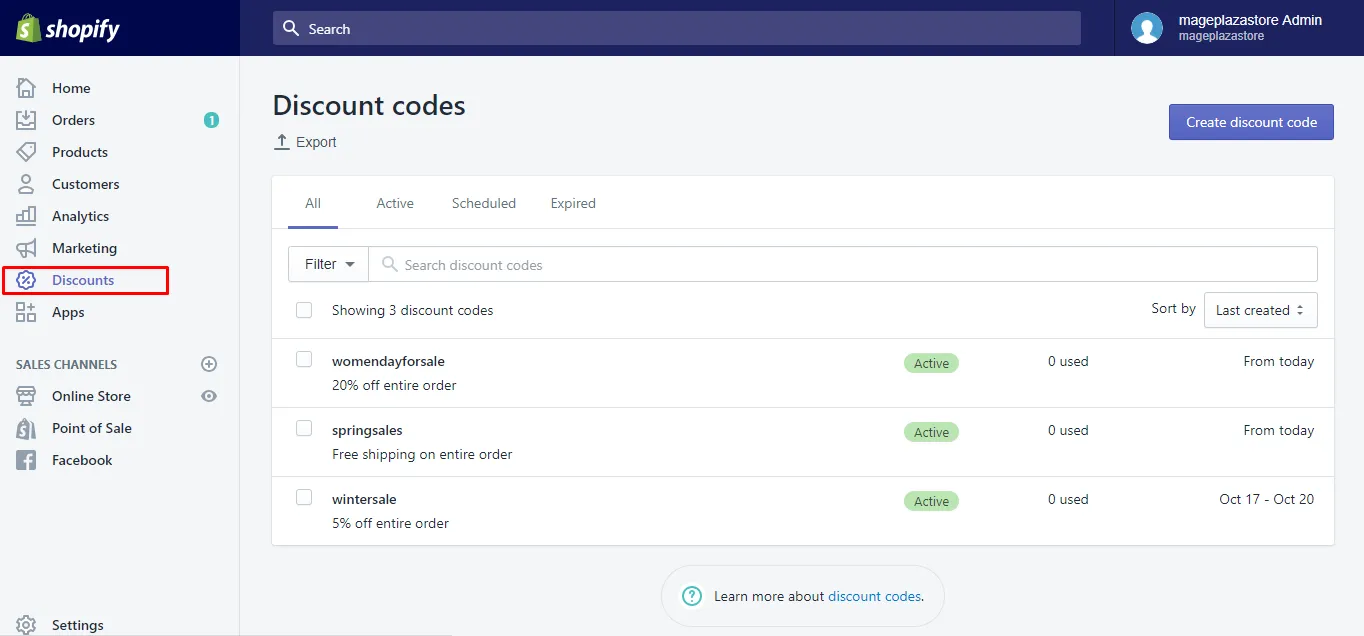
Shopify’s promotion tools are designed to be user-friendly, with a simple interface for setting up and managing discounts. Merchants can also schedule promotions in advance and track their performance through the Shopify dashboard. Additionally, Shopify’s app store offers a variety of apps that provide advanced promotion features, such as flash sales, countdown timers, and gift-with-purchase offers.
Abandoned cart recovery is another area where Shopify excels. The platform automatically sends reminder emails to customers who leave items in their cart without completing the purchase. These emails can be customized to include personalized messaging, discount offers, or product recommendations, helping to recapture lost sales and increase conversion rates.
BigCommerce
BigCommerce also provides a robust set of tools for creating discounts, promotions, and managing abandoned cart recovery. The platform supports a wide range of discount types, including percentage-based discounts, fixed-amount discounts, and free shipping offers. BigCommerce also allows merchants to create complex promotions, such as multi-buy discounts, buy-one-get-one offers, and tiered pricing based on customer segments.
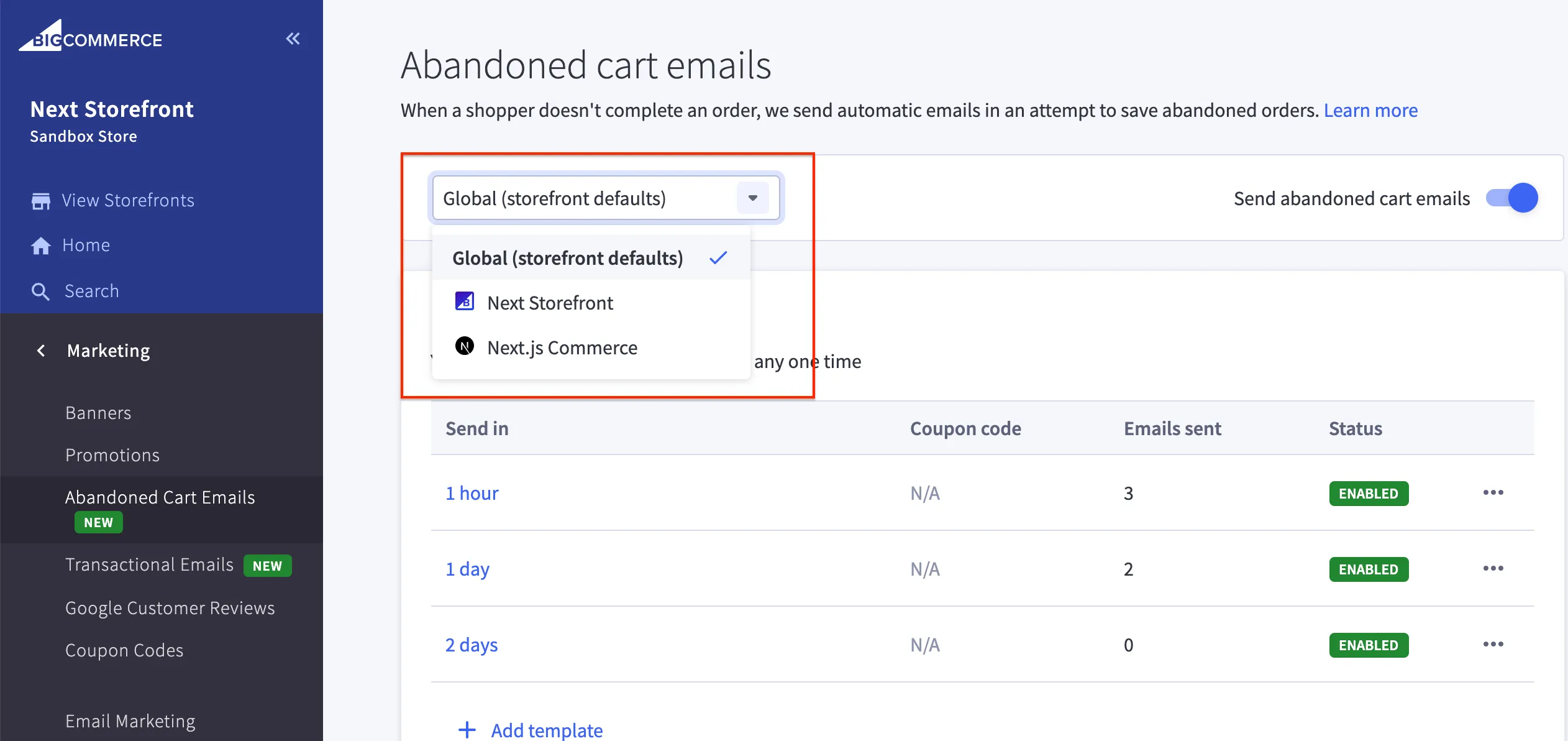
BigCommerce’s promotion tools are highly customizable, allowing businesses to set specific criteria for when discounts should be applied. Merchants can create customer groups, offer discounts based on customer behavior, and even apply discounts automatically at checkout. BigCommerce also provides detailed reporting on promotion performance, enabling businesses to optimize their strategies for better results.
Abandoned cart recovery on BigCommerce is designed to be flexible and effective. The platform allows merchants to send multiple reminder emails, customize the content, and track the success of their recovery campaigns. BigCommerce also integrates with third-party abandoned cart recovery tools, providing additional options for businesses looking to enhance their recovery efforts.
Shopify vs BigCommerce
When comparing Shopify vs BigCommerce in terms of discounts, promotions, and abandoned cart recovery, both platforms offer powerful tools that can help businesses increase sales and reduce cart abandonment. Shopify’s user-friendly promotion tools and strong abandoned cart recovery features make it a great choice for businesses looking for simplicity and effectiveness. BigCommerce, with its advanced promotion capabilities and flexible discount options, is ideal for businesses that require more customization and control over their promotional strategies. Both platforms excel in this area, making them strong contenders for businesses focused on maximizing revenue through discounts and promotions.
Content Marketing Features (Blogs, Landing Pages)
Shopify
Content marketing is a vital component of any eCommerce strategy, and Shopify provides a range of tools to help businesses create and manage content. Shopify includes a built-in blogging platform that allows merchants to create and publish blog posts directly from the Shopify dashboard. The blogging tool is simple to use and supports features like tags, categories, and SEO optimization, making it easy for businesses to create content that drives traffic and engages customers.
In addition to blogging, Shopify allows businesses to create custom landing pages using the platform’s drag-and-drop page builder. These landing pages can be used for product launches, promotions, or other marketing campaigns, providing a targeted experience for visitors. Shopify’s landing pages are fully customizable, allowing businesses to adjust the design, layout, and content to match their brand and goals.
Shopify’s app store offers a variety of content marketing apps that extend the platform’s capabilities. These apps include tools for content creation, social sharing, and content analytics, helping businesses optimize their content marketing efforts for better results.
BigCommerce
BigCommerce also offers strong content marketing features, providing businesses with the tools they need to create and manage content effectively. BigCommerce includes a built-in blogging platform that is designed for SEO optimization, making it easy for businesses to publish content that ranks well on search engines. The platform supports tags, categories, and scheduling, allowing businesses to plan their content strategy in advance.
BigCommerce’s Page Builder tool enables merchants to create custom landing pages with ease. The drag-and-drop interface allows businesses to design pages that align with their brand and marketing objectives. Whether it’s a product launch, seasonal promotion, or lead generation campaign, BigCommerce’s landing pages are fully customizable and designed to convert visitors into customers.
BigCommerce also integrates with popular content marketing tools, such as WordPress and HubSpot, providing additional options for businesses looking to expand their content marketing efforts. The platform’s app marketplace includes a range of content marketing apps that offer features like content creation, social sharing, and analytics.
Shopify vs BigCommerce
In the Shopify vs BigCommerce comparison for content marketing features, both platforms offer robust tools for blogging and landing page creation. Shopify’s built-in blogging tool and customizable landing pages make it a strong choice for businesses looking for an easy-to-use content marketing solution. BigCommerce, with its advanced blogging platform and flexible landing page builder, is ideal for businesses that prioritize SEO and require more control over their content strategy. Both platforms provide the necessary tools to create and manage content that engages customers and drives traffic, making them excellent choices for businesses focused on content marketing.
Analytics and Reporting
Analytics and reporting are critical components of eCommerce success, enabling businesses to track performance, understand customer behavior, and make data-driven decisions. Both Shopify and BigCommerce offer robust analytics and reporting tools, but they differ in the depth and flexibility of the insights they provide. In this section, we will compare the analytics and reporting capabilities of Shopify vs BigCommerce, focusing on built-in analytics, integration with Google Analytics and other tools, sales reporting and conversion tracking, and customer insights and behavior analysis.
Built-in Analytics and Dashboards
Shopify
Shopify offers a comprehensive set of built-in analytics tools that provide merchants with valuable insights into their store’s performance. The Shopify dashboard features an intuitive interface that displays key metrics at a glance, such as total sales, online store sessions, top products, and returning customer rates. This makes it easy for merchants to quickly assess the health of their business without needing to dive into detailed reports.
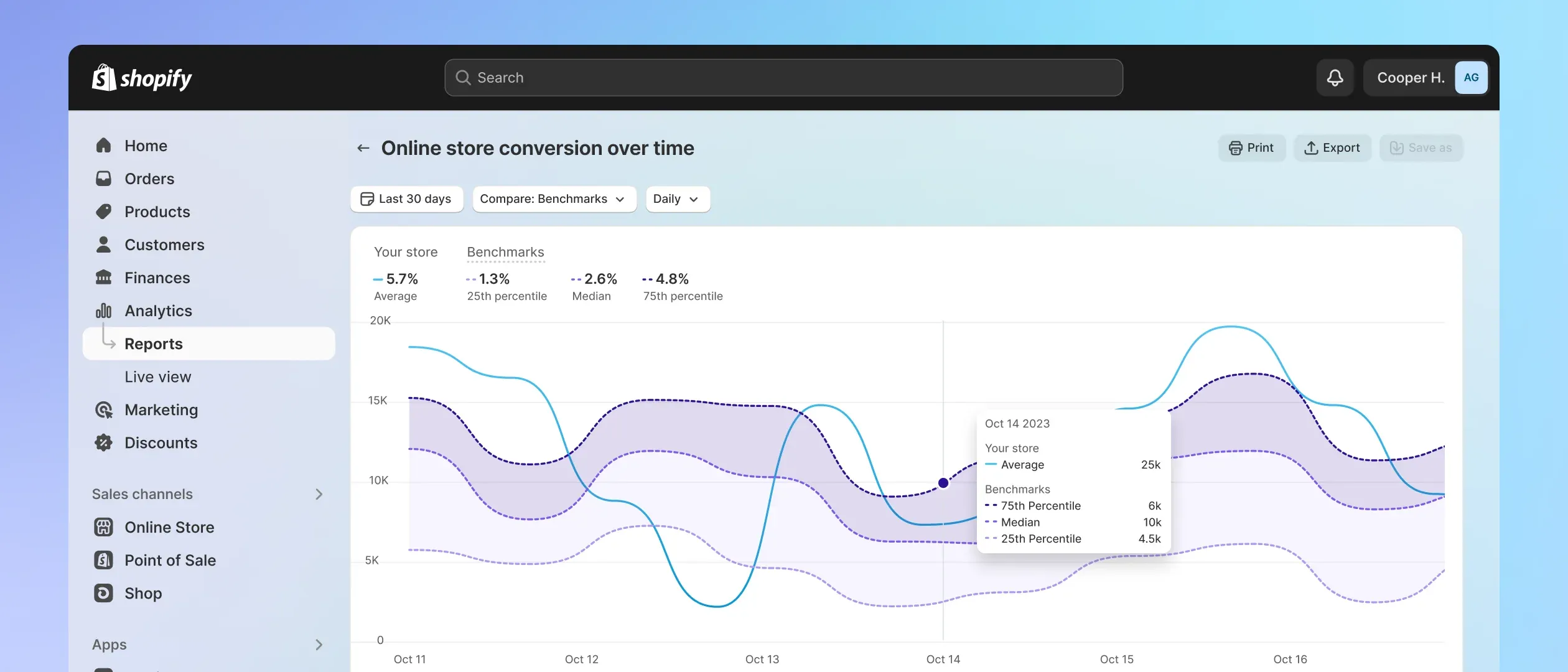
Shopify’s built-in analytics cover a wide range of data points, including sales, orders, customer behavior, and traffic sources. Merchants can access reports on sales by product, sales by traffic source, sales over time, and more. Shopify also provides insights into customer behavior, such as average order value (AOV), customer lifetime value (CLV), and customer acquisition costs, which are essential for understanding the effectiveness of marketing efforts and customer retention strategies.
In addition to its built-in reports, Shopify offers advanced reporting features on its higher-tier plans. These advanced reports provide deeper insights into business performance, including custom reports that allow merchants to filter and segment data based on specific criteria. This level of detail is particularly useful for businesses that require granular data to inform their decision-making processes.
BigCommerce
BigCommerce also provides a powerful set of built-in analytics and dashboards designed to give merchants a comprehensive view of their store’s performance. The BigCommerce control panel features a robust analytics dashboard that offers real-time insights into sales, orders, customer data, and more. The dashboard is customizable, allowing merchants to tailor the display of metrics according to their specific needs and priorities.
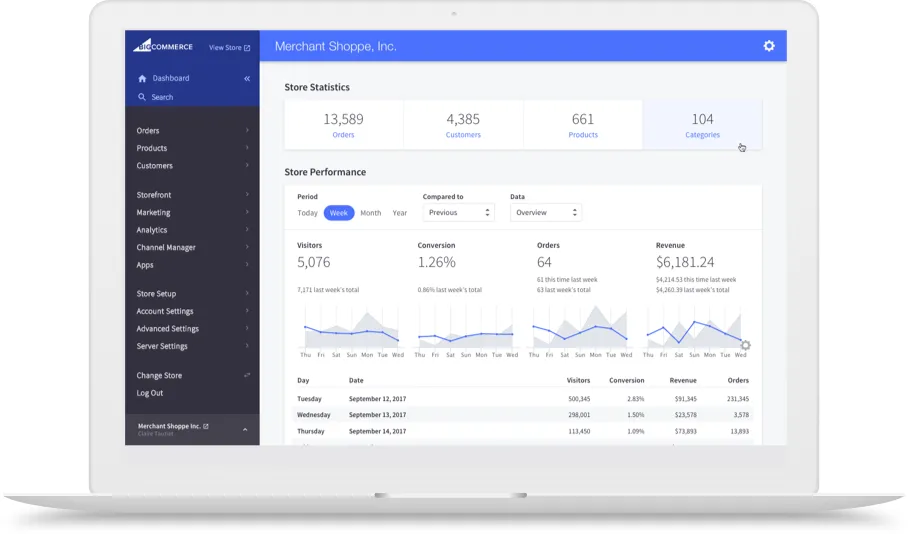
BigCommerce’s built-in analytics include detailed reports on sales performance, product performance, customer behavior, and traffic sources. Merchants can access data on sales by product, sales by customer segment, sales over time, and other important metrics. BigCommerce also provides advanced analytics on conversion rates, cart abandonment, and average order value, helping businesses identify areas for improvement and optimize their sales funnel.
One of the standout features of BigCommerce’s analytics is its ability to segment data by customer group, allowing businesses to understand the behavior of different customer segments. This is particularly useful for businesses that target multiple customer demographics or offer tiered pricing and discounts. Additionally, BigCommerce offers advanced reporting features that provide in-depth insights into product performance, customer acquisition, and marketing effectiveness.
Shopify vs BigCommerce
In the Shopify vs BigCommerce comparison for built-in analytics and dashboards, both platforms offer robust tools that provide merchants with valuable insights into their store’s performance. Shopify’s analytics are user-friendly and cover a broad range of metrics, making them accessible to businesses of all sizes. BigCommerce, on the other hand, offers more advanced segmentation and customization options, making it a better fit for businesses that require detailed insights into specific customer groups or product categories. Both platforms excel in providing real-time data and comprehensive reports, but the choice between them will depend on the specific analytical needs of the business.
Integration with Google Analytics and Other Tools
Shopify
Shopify integrates seamlessly with Google Analytics, one of the most widely used web analytics tools in the world. By connecting their Shopify store to Google Analytics, merchants can gain access to a wealth of additional data and insights, including detailed information on traffic sources, user behavior, and conversion tracking. Google Analytics integration allows merchants to track key performance indicators (KPIs) such as bounce rate, session duration, and goal completions, which are critical for optimizing the user experience and improving conversion rates.
Shopify also supports integration with other analytics tools, such as Facebook Pixel, which is essential for tracking the effectiveness of social media advertising campaigns. Additionally, Shopify’s app store offers a variety of third-party analytics apps that provide enhanced reporting capabilities, such as heatmaps, advanced funnel analysis, and customer journey tracking. These integrations allow businesses to tailor their analytics setup to their specific needs, providing deeper insights into customer behavior and marketing effectiveness.
Shopify’s integration with Google Analytics is straightforward to set up, with step-by-step guides provided by Shopify to help merchants configure their accounts and start tracking data. This ease of integration makes Shopify an excellent choice for businesses that want to leverage the full power of Google Analytics without needing extensive technical expertise.
BigCommerce
BigCommerce also offers seamless integration with Google Analytics, providing merchants with access to comprehensive data on traffic, user behavior, and conversion tracking. By integrating Google Analytics with their BigCommerce store, merchants can track a wide range of metrics, including user acquisition, site engagement, and eCommerce conversions. This integration allows businesses to gain a deeper understanding of how visitors interact with their site and identify opportunities for optimization.
In addition to Google Analytics, BigCommerce supports integration with a variety of other analytics and tracking tools, such as Facebook Pixel, Google Tag Manager, and HubSpot. These integrations enable merchants to track the performance of their marketing campaigns, analyze customer behavior, and measure the ROI of their advertising efforts. BigCommerce also offers built-in support for enhanced eCommerce tracking, which provides more detailed data on product performance, checkout behavior, and purchase funnels.
BigCommerce’s integration with Google Analytics and other tools is designed to be flexible and customizable, allowing businesses to configure their analytics setup according to their specific needs. This flexibility is particularly beneficial for larger businesses or those with complex analytics requirements, as it allows them to capture and analyze data at a granular level.
Shopify vs BigCommerce
In the Shopify vs BigCommerce comparison for integration with Google Analytics and other tools, both platforms offer strong capabilities that enable businesses to track and analyze a wide range of metrics. Shopify’s integration with Google Analytics is user-friendly and well-supported, making it an excellent choice for businesses that want a straightforward setup. BigCommerce, with its flexible integration options and support for advanced tracking, is ideal for businesses that require more customized analytics solutions. Both platforms provide the tools needed to gain deep insights into customer behavior and marketing effectiveness, but the choice between them will depend on the specific needs and technical expertise of the business.
Sales Reports and Conversion Tracking
Shopify
Sales reports and conversion tracking are essential for understanding the effectiveness of an online store’s marketing efforts and overall performance, and Shopify provides a range of tools to help merchants track these metrics. Shopify’s sales reports offer detailed insights into sales performance, including sales by product, sales by channel, and sales by customer. Merchants can also track metrics such as gross sales, net sales, and refunds, providing a clear picture of the store’s financial performance.
Shopify’s conversion tracking tools allow merchants to monitor the effectiveness of their marketing campaigns and identify areas for improvement. The platform tracks key conversion metrics, such as add-to-cart rates, checkout completion rates, and abandoned carts, helping businesses understand where customers drop off in the purchase process. Shopify also provides insights into conversion rates by traffic source, enabling merchants to identify which marketing channels are driving the most sales.
Shopify’s advanced reporting features, available on higher-tier plans, offer even more detailed sales and conversion data. These reports allow merchants to segment sales data by customer group, location, and device, providing a deeper understanding of how different factors impact sales performance. Additionally, Shopify integrates with third-party conversion tracking tools, such as Google Ads and Facebook Ads, allowing businesses to track the ROI of their advertising campaigns and optimize their marketing spend.
BigCommerce
BigCommerce offers powerful sales reporting and conversion tracking tools that provide merchants with a comprehensive view of their store’s performance. BigCommerce’s sales reports cover a wide range of metrics, including sales by product, sales by channel, and sales by customer group. Merchants can also track metrics such as average order value, total orders, and revenue by time period, providing valuable insights into the store’s financial health.
BigCommerce’s conversion tracking tools are designed to help businesses optimize their sales funnel and improve conversion rates. The platform tracks key conversion metrics, such as cart abandonment rates, checkout completion rates, and purchase funnel drop-offs. BigCommerce also provides insights into conversion rates by traffic source, allowing merchants to identify the most effective marketing channels and make data-driven decisions to improve performance.
One of the standout features of BigCommerce’s reporting tools is its ability to segment data by customer group, product category, and other criteria. This level of detail allows businesses to analyze sales and conversion data at a granular level, providing deeper insights into customer behavior and preferences. BigCommerce also integrates with third-party conversion tracking tools, such as Google Ads, to help businesses track the effectiveness of their advertising campaigns and optimize their marketing strategies.
Shopify vs BigCommerce
In the Shopify vs BigCommerce comparison for sales reports and conversion tracking, both platforms offer robust tools that provide valuable insights into sales performance and conversion rates. Shopify’s reports are user-friendly and cover a broad range of metrics, making them accessible to businesses of all sizes. BigCommerce, with its advanced segmentation options and detailed conversion tracking, is ideal for businesses that require deeper insights into specific customer groups or product categories. Both platforms excel in providing the data needed to optimize sales and marketing efforts, but the choice between them will depend on the specific analytical needs of the business.
Customer Insights and Behavior Analysis
Shopify
Understanding customer behavior is crucial for optimizing the shopping experience and increasing customer retention, and Shopify offers a range of tools to help businesses gain insights into their customers. Shopify’s customer reports provide detailed information on customer behavior, including purchase history, order frequency, and average order value. These reports allow merchants to segment customers based on their purchase behavior, helping businesses identify their most valuable customers and tailor their marketing efforts accordingly.
Shopify’s customer insights tools also include data on customer lifetime value (CLV) and customer acquisition cost (CAC), which are essential metrics for understanding the long-term profitability of customer relationships. Merchants can use this data to inform their customer retention strategies and optimize their marketing spend to focus on high-value customers.
In addition to its built-in customer insights tools, Shopify integrates with third-party apps that provide advanced behavior analysis, such as heatmaps, session recordings, and customer journey mapping. These tools help businesses gain a deeper understanding of how customers interact with their store, identify pain points in the shopping experience, and make data-driven decisions to improve customer satisfaction and increase conversions.
BigCommerce
BigCommerce provides a comprehensive set of tools for analyzing customer behavior and gaining insights into customer preferences. BigCommerce’s customer reports offer detailed information on purchase history, order frequency, and customer lifetime value, allowing businesses to segment customers based on their behavior and tailor their marketing efforts to different customer groups.
One of the key strengths of BigCommerce’s customer insights tools is its ability to segment data by customer group, product category, and other criteria. This level of detail allows businesses to analyze customer behavior at a granular level, providing valuable insights into customer preferences and shopping patterns. BigCommerce also provides data on customer acquisition cost (CAC) and customer lifetime value (CLV), helping businesses understand the long-term profitability of their customer relationships.
BigCommerce integrates with third-party apps that offer advanced behavior analysis, such as heatmaps, session recordings, and customer journey mapping. These tools provide deeper insights into how customers interact with the store, helping businesses identify areas for improvement and optimize the shopping experience to increase conversions and customer satisfaction.
Shopify vs BigCommerce
In the Shopify vs BigCommerce comparison for customer insights and behavior analysis, both platforms offer strong tools that provide valuable insights into customer behavior and preferences. Shopify’s customer reports are user-friendly and cover a wide range of metrics, making them accessible to businesses of all sizes. BigCommerce, with its advanced segmentation options and detailed behavior analysis tools, is ideal for businesses that require deeper insights into specific customer groups or product categories. Both platforms excel in providing the data needed to optimize the shopping experience and increase customer retention, but the choice between them will depend on the specific analytical needs of the business.
App Ecosystem and Integrations
The app ecosystem and integrations are critical components of an eCommerce platform’s flexibility and scalability. They enable businesses to extend the functionality of their online stores, integrate with essential third-party tools, and create a customized experience tailored to their specific needs. Both Shopify and BigCommerce offer robust app ecosystems and integration capabilities, but there are key differences in the availability, variety, and quality of their offerings.
App Store Availability and Variety
Shopify
Shopify boasts one of the largest and most diverse app ecosystems in the eCommerce industry. The Shopify App Store offers over 8,000 apps, catering to a wide range of business needs, from marketing and sales to inventory management, customer service, and beyond. This extensive app store is one of Shopify’s standout features, providing businesses with the tools they need to enhance their store’s functionality and streamline operations.
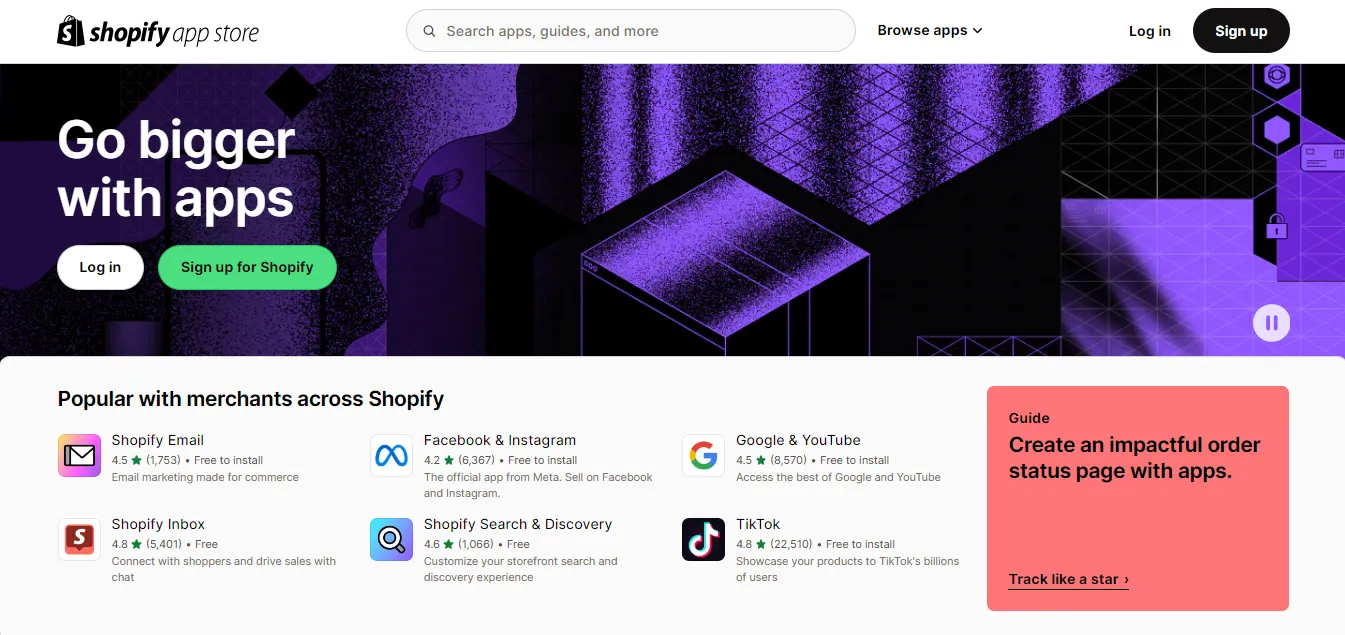
The Shopify App Store includes both free and paid apps, developed by Shopify and third-party developers. These apps cover virtually every aspect of eCommerce, including SEO optimization, social media marketing, dropshipping, shipping solutions, customer loyalty programs, and much more. The wide variety of apps available ensures that businesses can find the right tools to meet their unique needs, whether they are just starting out or are well-established enterprises looking to scale.
Shopify’s app store is also known for its ease of use. Apps can be easily installed and configured directly from the Shopify dashboard, with most apps requiring minimal setup. Shopify provides detailed descriptions, user reviews, and ratings for each app, helping merchants make informed decisions about which apps are best suited for their business.
BigCommerce
BigCommerce also offers a strong app ecosystem, with its BigCommerce App Marketplace providing access to over 1,000 apps. While smaller in scale compared to Shopify’s app store, BigCommerce’s marketplace is carefully curated to include high-quality apps that address the core needs of eCommerce businesses. The apps available on BigCommerce cover a wide range of categories, including marketing, accounting, shipping, inventory management, and customer engagement.
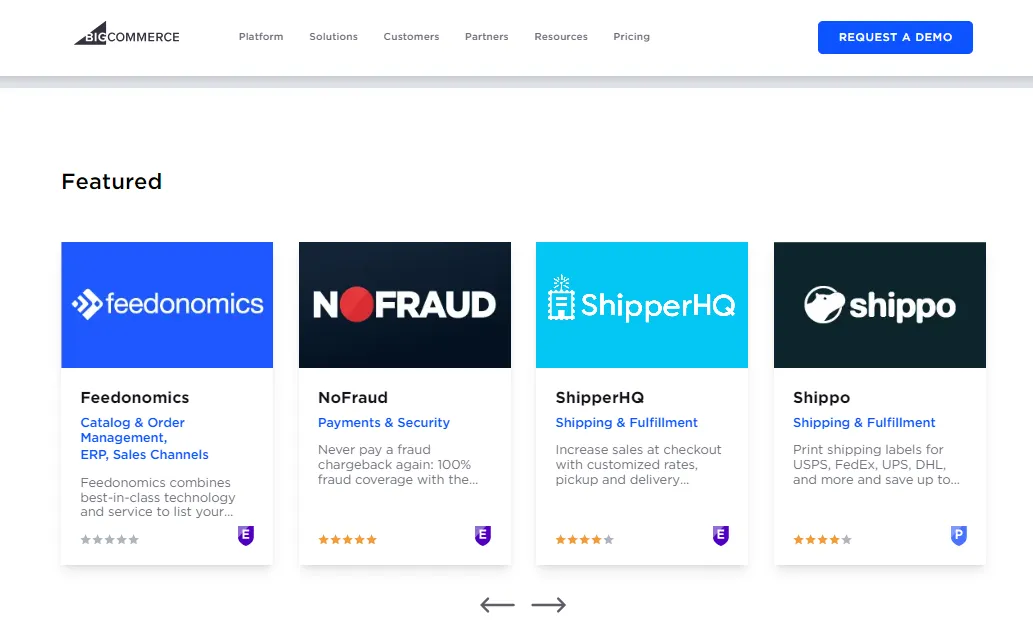
BigCommerce’s app marketplace includes both free and paid apps, developed by BigCommerce and third-party developers. The platform places a strong emphasis on quality, ensuring that all apps undergo a rigorous review process before being listed in the marketplace. This focus on quality means that merchants can trust the apps they install to perform reliably and integrate seamlessly with their BigCommerce store.
One of the strengths of BigCommerce’s app marketplace is its focus on enterprise-level solutions. The platform offers a range of apps designed specifically for large and growing businesses, including advanced ERP and CRM integrations, enterprise-grade security tools, and powerful analytics solutions. This makes BigCommerce a strong contender for businesses that require robust, scalable solutions to support their growth.
Shopify vs BigCommerce
In the Shopify vs BigCommerce comparison for app store availability and variety, Shopify offers a larger and more diverse app ecosystem, making it an excellent choice for businesses looking for a wide range of options to customize and enhance their store. BigCommerce, while offering a smaller app marketplace, focuses on quality and enterprise-level solutions, making it ideal for businesses that require powerful, reliable apps to support their operations. Both platforms provide the tools needed to extend functionality and improve efficiency, but the choice between them will depend on the specific needs and scale of the business.
Third-Party Integrations (ERP, CRM, Accounting Software)
Shopify
Shopify excels in its ability to integrate with a wide range of third-party software, making it a highly flexible platform for businesses that rely on multiple systems to manage their operations. Shopify’s integrations cover essential business functions such as enterprise resource planning (ERP), customer relationship management (CRM), and accounting.
For ERP, Shopify integrates with popular solutions like NetSuite, SAP, and Microsoft Dynamics. These integrations enable businesses to sync their online store data with their ERP system, ensuring accurate inventory management, order processing, and financial reporting. Shopify’s ERP integrations are designed to be seamless, allowing businesses to scale their operations without the need for extensive manual data entry.
In terms of CRM, Shopify integrates with leading platforms such as Salesforce, HubSpot, and Zoho CRM. These integrations allow businesses to manage customer relationships more effectively by syncing customer data, tracking interactions, and automating marketing campaigns. Shopify’s CRM integrations are particularly valuable for businesses that focus on personalized marketing and customer retention strategies.
Shopify also offers robust accounting software integrations, including QuickBooks, Xero, and FreshBooks. These integrations streamline financial management by automatically syncing sales data, generating invoices, and tracking expenses. Shopify’s accounting integrations help businesses maintain accurate financial records and simplify the process of tax filing and financial reporting.
BigCommerce
BigCommerce offers a strong suite of third-party integrations, particularly for businesses that require advanced solutions to manage their operations. BigCommerce integrates with a wide range of ERP, CRM, and accounting software, providing businesses with the flexibility to choose the tools that best fit their needs.
For ERP, BigCommerce integrates with leading solutions such as NetSuite, SAP, and Microsoft Dynamics. These integrations enable businesses to automate key processes such as inventory management, order fulfillment, and financial reporting, reducing the risk of errors and improving operational efficiency. BigCommerce’s ERP integrations are designed to support complex, large-scale operations, making them ideal for enterprise-level businesses.
BigCommerce also offers seamless integration with popular CRM platforms like Salesforce, HubSpot, and Marketo. These integrations allow businesses to manage customer relationships more effectively by centralizing customer data, automating marketing campaigns, and tracking customer interactions across multiple channels. BigCommerce’s CRM integrations are particularly useful for businesses that focus on data-driven marketing and customer segmentation.
In the area of accounting, BigCommerce integrates with software such as QuickBooks, Xero, and Sage. These integrations help businesses manage their finances more efficiently by automating tasks such as invoicing, expense tracking, and financial reporting. BigCommerce’s accounting integrations are designed to be flexible, allowing businesses to customize their financial workflows according to their specific needs.
Shopify vs BigCommerce
In the Shopify vs BigCommerce comparison for third-party integrations, both platforms offer robust and flexible integration options that cater to a wide range of business needs. Shopify provides seamless integrations with popular ERP, CRM, and accounting software, making it a strong choice for businesses that value ease of use and a wide range of options. BigCommerce, with its focus on enterprise-level integrations, is ideal for businesses that require advanced, scalable solutions to manage complex operations. Both platforms excel in providing the tools needed to integrate with essential third-party systems, but the choice between them will depend on the specific requirements of the business.
API Capabilities and Developer Tools
Shopify
Shopify offers a powerful and well-documented API (Application Programming Interface) that allows developers to create custom integrations, apps, and workflows for their Shopify stores. The Shopify API provides access to a wide range of data points, including products, orders, customers, and inventory, enabling developers to build highly customized solutions that meet the specific needs of their clients.
The Shopify API is RESTful and supports both JSON and XML formats, making it accessible to developers with varying levels of experience. Shopify also offers a GraphQL API, which provides a more efficient way to query and manipulate data, reducing the number of API requests needed to retrieve information. This makes the Shopify API highly flexible and efficient, allowing developers to build complex, data-driven applications with ease.
In addition to its API, Shopify provides a comprehensive set of developer tools, including the Shopify CLI (Command Line Interface) and the Shopify App Bridge. These tools streamline the development process by providing a standardized environment for building and testing apps, themes, and custom integrations. Shopify’s developer tools are designed to be user-friendly, with extensive documentation, tutorials, and support available to help developers get started quickly.
BigCommerce
BigCommerce offers a robust set of API capabilities and developer tools that cater to businesses with complex needs and developers looking to build custom solutions. The BigCommerce API is known for its flexibility and scalability, providing access to a wide range of data points, including products, categories, customers, orders, and more. The API is RESTful and supports both JSON and XML formats, making it accessible to developers with different levels of experience.
One of the standout features of the BigCommerce API is its ability to handle large volumes of data, making it ideal for enterprise-level businesses with extensive product catalogs and high traffic levels. The BigCommerce API also supports advanced features such as webhooks, which allow developers to create real-time integrations that trigger actions based on specific events, such as order creation or inventory updates.
BigCommerce provides a comprehensive set of developer tools, including the BigCommerce CLI, which streamlines the process of developing and deploying custom apps and integrations. The platform also offers extensive documentation, tutorials, and support, making it easier for developers to build and maintain custom solutions. BigCommerce’s developer tools are designed to support complex, large-scale projects, making them ideal for businesses that require advanced customization and scalability.
Shopify vs BigCommerce
In the Shopify vs BigCommerce comparison for API capabilities and developer tools, both platforms offer powerful and flexible APIs that enable developers to create custom integrations and applications. Shopify’s API is known for its ease of use and efficiency, making it a great choice for developers who value simplicity and speed. BigCommerce, with its focus on scalability and advanced features, is ideal for businesses that require robust, enterprise-level solutions. Both platforms provide extensive documentation and support, but the choice between them will depend on the specific needs and technical expertise of the business and its development team.
Quality and Support of Add-ons and Extensions
Shopify
Shopify is renowned for the quality of its add-ons and extensions, which are available through the Shopify App Store. The apps listed in the Shopify App Store undergo a rigorous review process to ensure they meet Shopify’s high standards for performance, security, and user experience. This focus on quality means that merchants can trust the apps they install to work seamlessly with their Shopify store and provide the functionality they need.
Shopify also provides strong support for its add-ons and extensions, with extensive documentation, tutorials, and customer support available to help merchants get the most out of their apps. The Shopify community is also a valuable resource, with forums, user groups, and developer communities available to provide advice, share best practices, and troubleshoot issues.
In addition to official Shopify support, many third-party developers offer dedicated support for their apps, providing merchants with direct access to the expertise they need to resolve any issues that arise. This combination of high-quality apps and strong support makes Shopify an excellent choice for businesses that want to enhance their store’s functionality with reliable, well-supported add-ons and extensions.
BigCommerce
BigCommerce places a strong emphasis on the quality and support of its add-ons and extensions, ensuring that merchants have access to reliable, high-performance apps that integrate seamlessly with their BigCommerce store. The apps listed in the BigCommerce App Marketplace undergo a thorough vetting process to ensure they meet BigCommerce’s standards for security, performance, and usability.
BigCommerce provides extensive support for its add-ons and extensions, with detailed documentation, tutorials, and customer support available to help merchants get the most out of their apps. The BigCommerce community is also an active and valuable resource, with forums, user groups, and developer communities available to provide advice, share best practices, and troubleshoot issues.
Many third-party developers who create apps for BigCommerce also offer dedicated support, providing merchants with direct access to the expertise they need to resolve any issues that arise. This focus on quality and support makes BigCommerce a strong choice for businesses that require reliable, well-supported add-ons and extensions to enhance their store’s functionality.
Shopify vs BigCommerce
In the Shopify vs BigCommerce comparison for the quality and support of add-ons and extensions, both platforms offer high-quality apps that are rigorously vetted to ensure they meet performance and security standards. Shopify’s extensive app store and strong support infrastructure make it an excellent choice for businesses that value reliability and ease of use. BigCommerce, with its focus on enterprise-level solutions and strong support, is ideal for businesses that require robust, well-supported add-ons to enhance their store’s functionality. Both platforms excel in providing the tools and support needed to customize and extend the capabilities of an online store, but the choice between them will depend on the specific needs and priorities of the business.
Performance and Scalability
Performance and scalability are critical factors to consider when choosing an eCommerce platform. As your business grows, the ability of your platform to handle increased traffic, larger inventories, and more complex operations will directly impact your store’s success.
Hosting and Speed
Shopify
Shopify is a fully hosted eCommerce platform, which means that Shopify takes care of all the hosting and technical aspects for you. This hosted solution is one of Shopify’s most significant advantages, as it simplifies the process of running an online store. Businesses don’t need to worry about purchasing a separate hosting plan, managing servers, or dealing with the complexities of site maintenance and security. Shopify’s hosting is optimized for eCommerce, ensuring that your store runs smoothly and efficiently.
Shopify’s hosting infrastructure is built on a global network of servers, providing high availability and fast load times for your store. Shopify boasts a 99.98% uptime guarantee, ensuring that your store is accessible to customers around the clock. Additionally, Shopify uses a content delivery network (CDN) to distribute your store’s content across multiple locations worldwide. This network of servers ensures that customers can access your store quickly, regardless of their geographic location, reducing latency and improving page load times.
Speed is a critical factor in eCommerce, as faster-loading sites tend to rank better in search engines and provide a better user experience, leading to higher conversion rates. Shopify’s platform is optimized for speed, with minimal loading times for both desktop and mobile users. The themes provided by Shopify are also optimized for performance, ensuring that even heavily customized stores load quickly.
Shopify also offers unlimited bandwidth and automatic scaling during traffic spikes, such as Black Friday or major promotional events, ensuring that your store remains fast and responsive even during peak times. The platform also handles all security updates, SSL certificates, and PCI compliance, so you don’t need to worry about the technical details of securing your site.
BigCommerce
Like Shopify, BigCommerce is a fully hosted eCommerce platform, meaning that it manages all hosting and technical requirements for its users. BigCommerce provides enterprise-grade hosting, which is designed to support businesses of all sizes, from small startups to large enterprises. This hosted solution ensures that merchants can focus on growing their business without worrying about the complexities of server management and maintenance.
BigCommerce’s hosting infrastructure is built on a secure, scalable architecture, offering a 99.99% uptime guarantee. This high uptime ensures that your store is always available to customers, minimizing the risk of lost sales due to downtime. BigCommerce also uses a global content delivery network (CDN) to deliver your store’s content quickly to customers around the world. This CDN helps reduce latency, improves load times, and ensures that your store provides a fast, reliable experience for users, regardless of their location.
BigCommerce is known for its strong performance, particularly in terms of site speed. The platform is optimized to ensure that pages load quickly, which is essential for both SEO and customer satisfaction. BigCommerce provides built-in tools to monitor site speed and performance, allowing merchants to identify and resolve any issues that may be affecting their store’s loading times.
One of the key advantages of BigCommerce’s hosting is its ability to handle high traffic volumes and large inventories without compromising on speed or performance. The platform’s infrastructure is designed to automatically scale to accommodate traffic spikes, ensuring that your store remains responsive even during peak periods. BigCommerce also handles all security updates, SSL certificates, and PCI compliance, providing a secure environment for your online store.
Shopify vs BigCommerce
In the Shopify vs BigCommerce comparison for hosting and speed, both platforms offer robust, fully hosted solutions that take the complexity out of running an online store. Shopify’s global network and CDN ensure fast load times and high availability, making it an excellent choice for businesses that prioritize speed and ease of use. BigCommerce, with its enterprise-grade hosting and strong performance optimization, is ideal for businesses that require a platform capable of handling high traffic volumes and large inventories. Both platforms excel in providing fast, reliable hosting, but the choice between them will depend on the specific needs and scale of your business.
Scalability
Shopify
Scalability is a critical consideration for any growing business, and Shopify is designed to support businesses as they expand. Shopify’s infrastructure is built to handle growth, offering features that make it easy to scale your operations without switching platforms. Whether you’re just starting with a small online store or running a large enterprise, Shopify provides the tools and resources needed to grow your business.
One of Shopify’s key strengths is its ability to handle increasing traffic and sales volumes without compromising performance. The platform automatically scales to accommodate traffic spikes, ensuring that your store remains fast and responsive even during peak periods. Shopify’s unlimited bandwidth and product listings mean that you can expand your store’s inventory and reach a larger audience without worrying about hitting platform limits.
Shopify also offers various plans tailored to businesses at different stages of growth. As your business scales, you can upgrade to higher-tier plans that offer more advanced features, such as enhanced reporting, custom checkout experiences, and increased access to Shopify’s API. For large enterprises, Shopify Plus provides an enterprise-grade solution with additional customization options, dedicated support, and advanced tools designed to support global operations.
In addition to its technical scalability, Shopify’s app ecosystem plays a crucial role in supporting business growth. With thousands of apps available in the Shopify App Store, businesses can easily add new features and functionalities to their store as they expand. Whether you need advanced marketing tools, inventory management systems, or customer service solutions, Shopify’s app ecosystem provides the flexibility to scale your store’s capabilities in line with your business growth.
BigCommerce
BigCommerce is known for its strong scalability, making it a preferred choice for businesses with complex needs or those anticipating significant growth. The platform is designed to support businesses at every stage, from small startups to large enterprises, offering the tools and infrastructure needed to scale efficiently.
BigCommerce’s scalability is evident in its ability to handle large catalogs, high traffic volumes, and complex operations without compromising performance. The platform’s architecture is built to automatically scale during traffic surges, ensuring that your store remains responsive even during peak periods. BigCommerce’s unlimited product listings and bandwidth allow businesses to grow their inventory and reach more customers without the need to switch platforms.
BigCommerce offers various plans that cater to businesses of different sizes, with features that scale with your business’s needs. As your business grows, you can upgrade to higher-tier plans that provide advanced features such as custom facets, advanced reporting, and enterprise-level integrations. For large enterprises, BigCommerce offers BigCommerce Enterprise, a solution that provides advanced customization, dedicated support, and the scalability needed to support global operations.
One of BigCommerce’s standout features in terms of scalability is its ability to handle complex product catalogs and multi-channel selling. The platform supports businesses with extensive inventories and the need to sell across multiple channels, including online marketplaces, social media, and physical retail locations. BigCommerce’s strong API capabilities and integrations with ERP, CRM, and other enterprise systems make it an ideal choice for businesses with complex operational needs.
Shopify vs BigCommerce
In the Shopify vs BigCommerce comparison for scalability, both platforms offer robust solutions designed to support growing businesses. Shopify’s flexibility and extensive app ecosystem make it a great choice for businesses that want to scale their operations easily without switching platforms. BigCommerce, with its strong focus on handling large catalogs, high traffic volumes, and complex operations, is ideal for businesses that require a platform capable of supporting rapid growth and enterprise-level needs. Both platforms excel in providing the tools and infrastructure needed to scale, but the choice between them will depend on the specific growth trajectory and operational complexity of your business.
Ease of Use and Setup
When choosing an eCommerce platform, ease of use and the setup process are crucial factors that can significantly impact your ability to launch and manage your online store. A platform that is user-friendly and offers a straightforward onboarding process allows you to focus on growing your business rather than dealing with technical complexities.
Onboarding Process and Setup
Shopify
Shopify is widely recognized for its user-friendly onboarding process, which is designed to help merchants set up their online store quickly and efficiently. From the moment you sign up, Shopify guides you through the essential steps of creating your store, including selecting a theme, adding products, and configuring payment and shipping options. The platform offers a step-by-step setup wizard that simplifies the process, making it accessible even to those with limited technical knowledge.
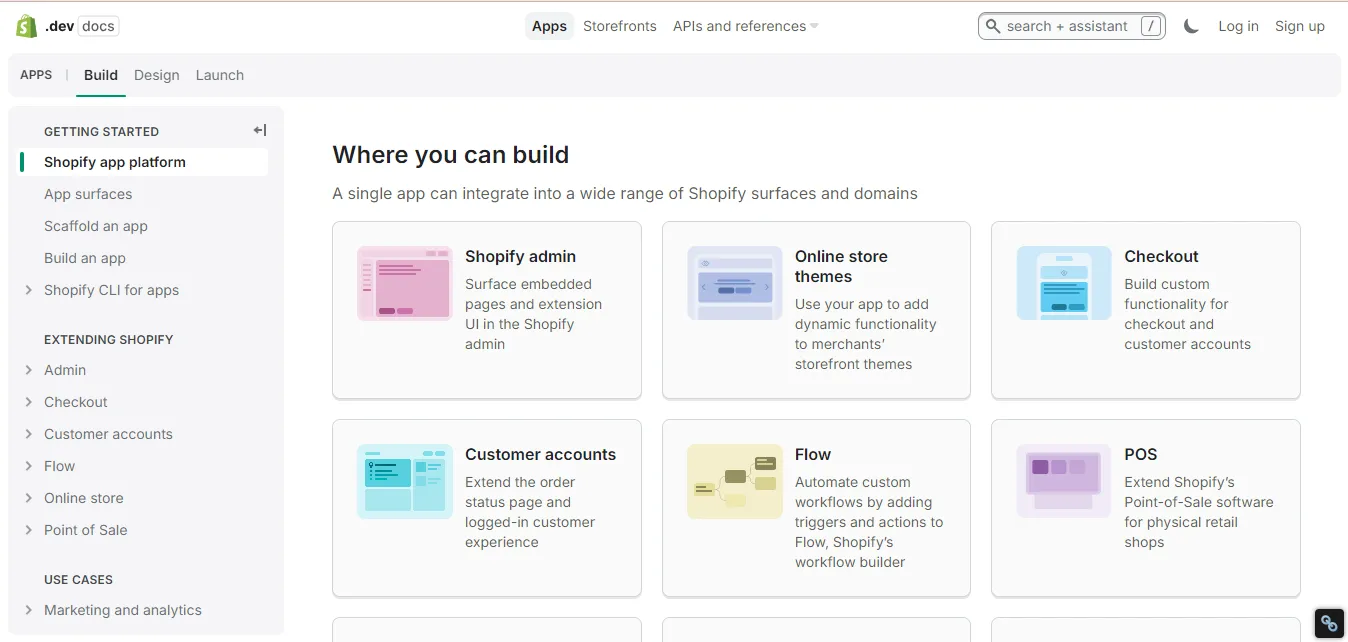
The Shopify onboarding process is intuitive and streamlined. Once you create an account, Shopify prompts you to choose a theme from its extensive collection. After selecting a theme, you can easily customize it using Shopify’s drag-and-drop editor, which allows you to adjust the layout, colors, and content without any coding. Shopify also provides a library of high-quality, free and premium themes, ensuring that businesses can find a design that suits their brand.
Adding products to your Shopify store is straightforward, with a simple interface that allows you to input product details, upload images, and manage inventory. Shopify also supports bulk product uploads via CSV files, which is particularly useful for businesses with large catalogs. Additionally, the platform offers built-in tools for setting up payment gateways, taxes, and shipping rates, all of which are accessible from a centralized dashboard.
Shopify’s onboarding process is further enhanced by its comprehensive documentation and tutorials, which provide clear instructions and best practices for setting up your store. For those who need additional assistance, Shopify offers 24/7 customer support via chat, email, and phone, ensuring that help is always available when you need it.
BigCommerce
BigCommerce also offers a user-friendly onboarding process, designed to help merchants get their online store up and running with minimal hassle. The platform provides a setup wizard that guides you through the key steps of creating your store, including choosing a theme, adding products, and configuring payment and shipping options. BigCommerce’s onboarding process is geared towards helping businesses of all sizes, from small startups to large enterprises, set up their store efficiently.
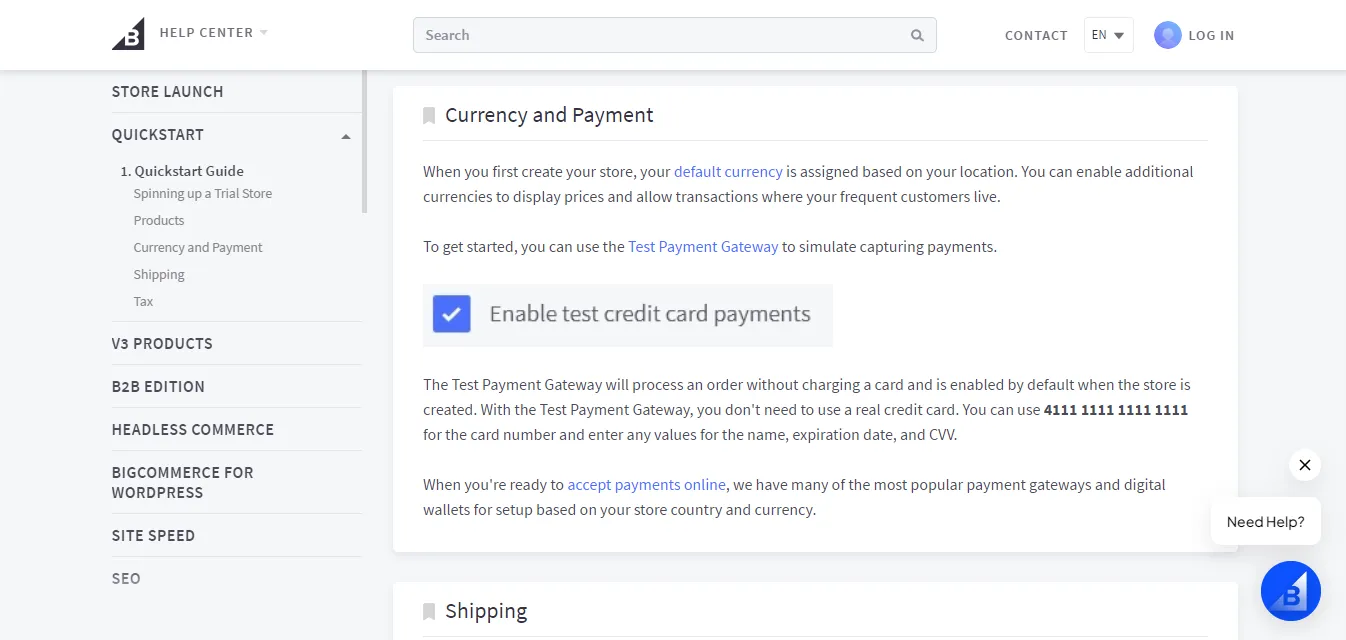
One of the strengths of BigCommerce’s onboarding process is its flexibility. The platform allows merchants to choose from a variety of themes, which can be customized using the BigCommerce Page Builder. This drag-and-drop editor makes it easy to modify the layout, design, and content of your store without needing any coding knowledge. BigCommerce also offers a selection of industry-specific themes, which are optimized for different types of products and businesses.
Adding products to your BigCommerce store is a seamless process, with an intuitive interface that allows you to input product details, manage inventory, and set pricing rules. BigCommerce supports bulk product uploads, making it easy to add large catalogs quickly. The platform also provides robust tools for setting up payment gateways, taxes, and shipping options, all of which can be managed from a centralized control panel.
BigCommerce’s onboarding process is supported by extensive documentation, video tutorials, and webinars, which provide merchants with the knowledge and best practices needed to succeed. Additionally, BigCommerce offers 24/7 customer support via chat, email, and phone, ensuring that help is always available when needed.
Shopify vs BigCommerce
In the Shopify vs BigCommerce comparison for onboarding process and setup, both platforms offer intuitive, user-friendly processes that make it easy to create and launch your online store. Shopify’s onboarding process is slightly more streamlined, with a focus on simplicity and accessibility, making it an excellent choice for beginners and small businesses. BigCommerce, with its flexible setup options and robust customization tools, is ideal for businesses that require more control over their store’s design and functionality. Both platforms provide comprehensive documentation and 24/7 support, ensuring that merchants have the resources they need to get their store up and running smoothly.
User Interface and Admin Panel
Shopify
Shopify is known for its clean, intuitive user interface (UI) and admin panel, which are designed to make managing your online store as simple as possible. The Shopify dashboard provides a centralized hub where merchants can access all the tools and features they need to run their store, from product management to order fulfillment and analytics.
The Shopify admin panel is organized into clear sections, such as Home, Orders, Products, Customers, Analytics, and Marketing, making it easy to navigate and find what you need. The Home section provides an overview of your store’s performance, with key metrics such as sales, traffic, and customer activity displayed in a concise, easy-to-understand format. This dashboard layout allows merchants to quickly assess the health of their business and make informed decisions.
One of the standout features of Shopify’s UI is its ease of use. The platform is designed with non-technical users in mind, meaning that even those with little to no coding experience can manage their store effectively. The drag-and-drop editor allows for easy customization of the storefront, and the product management interface is straightforward, with clear options for adding, editing, and organizing products.
Shopify’s admin panel is also responsive and mobile-friendly, allowing merchants to manage their store on the go. The Shopify mobile app provides access to key features such as order management, inventory updates, and customer communication, ensuring that you can keep your business running smoothly from anywhere.
BigCommerce
BigCommerce offers a powerful and flexible user interface and admin panel, designed to support businesses with more complex needs. The BigCommerce control panel is comprehensive, providing access to a wide range of features and tools that allow merchants to manage their store efficiently. While BigCommerce’s UI is slightly more feature-rich than Shopify’s, it remains user-friendly and accessible, making it a good choice for businesses of all sizes.
The BigCommerce admin panel is organized into sections such as Dashboard, Orders, Products, Customers, Marketing, and Analytics. The Dashboard provides an overview of your store’s performance, with key metrics and insights displayed in a clear, easy-to-read format. This central hub allows merchants to monitor their store’s activity and make data-driven decisions.
One of the key strengths of BigCommerce’s UI is its flexibility and customization options. The platform offers a range of advanced features, such as custom product fields, complex pricing rules, and multi-channel selling capabilities, all of which can be managed from the admin panel. While these features provide added functionality, they do add a layer of complexity, making BigCommerce better suited for businesses with more advanced needs.
BigCommerce’s admin panel is also mobile-responsive, allowing merchants to manage their store from any device. The BigCommerce mobile app provides access to essential features such as order management, inventory control, and customer communication, ensuring that you can stay connected to your business even when you’re on the move.
Shopify vs BigCommerce
In the Shopify vs BigCommerce comparison for user interface and admin panel, both platforms offer well-designed, user-friendly dashboards that make it easy to manage your online store. Shopify’s UI is slightly more streamlined and accessible, making it an excellent choice for small businesses and those with limited technical experience. BigCommerce, with its feature-rich admin panel and advanced customization options, is ideal for businesses that require more control over their operations. Both platforms provide responsive, mobile-friendly interfaces, allowing merchants to manage their store from anywhere.
Community and Support
Shopify
Shopify offers a robust support system that includes 24/7 customer service via chat, email, and phone. Whether you’re facing a technical issue or need guidance on how to use a specific feature, Shopify’s support team is available around the clock to assist you. This level of support is particularly valuable for businesses that operate in different time zones or need immediate help during peak times.
In addition to direct customer support, Shopify has a large and active community of users, developers, and experts. The Shopify Community Forum is a valuable resource where merchants can ask questions, share experiences, and learn from others. The forum covers a wide range of topics, from getting started with Shopify to advanced development and customization techniques. This collaborative environment helps merchants find solutions to common challenges and stay up-to-date with the latest trends and best practices in eCommerce.

Shopify also offers a wealth of educational resources, including a comprehensive Help Center, video tutorials, webinars, and blog posts. These resources cover everything from basic setup and configuration to advanced marketing strategies and app development, making it easy for merchants to expand their knowledge and improve their store’s performance.
For businesses that need additional support, Shopify offers a network of Shopify Experts—certified professionals who can assist with everything from store design and development to marketing and SEO. This expert marketplace allows merchants to find and hire professionals with the specific skills they need to grow their business.
BigCommerce
BigCommerce provides strong support for its users, including 24/7 customer service via chat, email, and phone. Whether you’re encountering a technical issue or need advice on optimizing your store, BigCommerce’s support team is available to help. The platform’s commitment to providing reliable, around-the-clock support ensures that businesses can get the assistance they need whenever they need it.
BigCommerce also boasts a vibrant community of users, developers, and experts who actively participate in the BigCommerce Community Forum. This forum is a valuable resource where merchants can ask questions, share experiences, and collaborate with others. The forum covers a wide range of topics, from getting started with BigCommerce to advanced development and integrations, providing merchants with a wealth of knowledge and insights.

In addition to its community forum, BigCommerce offers extensive educational resources, including a Help Center, video tutorials, webinars, and blog posts. These resources are designed to help merchants at every stage of their journey, from initial setup to advanced store management. BigCommerce’s educational content is regularly updated to reflect the latest features and best practices, ensuring that merchants have access to the most current information.
For businesses that require additional support, BigCommerce offers a network of certified BigCommerce Partners who can assist with design, development, marketing, and more. These experts are available to help businesses customize their store, optimize their operations, and implement advanced features, making it easier to scale and succeed.
Shopify vs BigCommerce
In the Shopify vs BigCommerce comparison for community and support, both platforms offer strong support systems that include 24/7 customer service, active user communities, and extensive educational resources. Shopify’s large and active community, combined with its network of certified experts, makes it an excellent choice for businesses that value collaboration and access to a wide range of resources. BigCommerce, with its comprehensive support and vibrant community, is ideal for businesses that require reliable assistance and advanced support options. Both platforms provide the tools and resources needed to succeed, but the choice between them will depend on your specific support needs and preferences.
Security and Compliance
Security and compliance are paramount in eCommerce, where the safety of customer data and adherence to regulations are critical to maintaining trust and avoiding legal issues. Both Shopify and BigCommerce prioritize security and compliance, offering a range of features and tools designed to protect online stores and ensure they meet industry standards.
Security Features
Shopify
Shopify is renowned for its robust security features, which are designed to protect both merchants and customers from potential threats. As a fully hosted platform, Shopify takes on the responsibility of managing all security aspects, including data protection, fraud prevention, and secure payment processing. This allows merchants to focus on running their business without worrying about the technical complexities of securing their online store.
One of the key security features offered by Shopify is its SSL (Secure Socket Layer) encryption, which is included with every Shopify store at no additional cost. SSL encryption ensures that all data transmitted between the store and customers is encrypted, protecting sensitive information such as credit card numbers and personal details from being intercepted by malicious parties. This encryption not only protects customer data but also boosts trust and can improve search engine rankings.
Shopify also provides PCI DSS (Payment Card Industry Data Security Standard) compliance, which is essential for any business that processes credit card payments. PCI DSS compliance ensures that Shopify meets the strict security standards required to protect payment information, reducing the risk of data breaches and fraud. By default, all Shopify stores are PCI compliant, meaning merchants don’t need to worry about configuring or maintaining these security measures themselves.
In addition to SSL and PCI compliance, Shopify offers advanced security features such as two-factor authentication (2FA) for account protection, automated backups, and continuous monitoring for suspicious activity. Shopify’s security team regularly updates the platform to protect against new vulnerabilities, ensuring that merchants are always protected against the latest threats.
BigCommerce
BigCommerce also places a strong emphasis on security, providing a range of features designed to protect online stores and their customers. Like Shopify, BigCommerce is a fully hosted platform, meaning that it handles all aspects of security, from data protection to fraud prevention and secure payment processing. This hosted model ensures that merchants can focus on growing their business while BigCommerce takes care of the technical details of security.
BigCommerce includes SSL encryption with every store, providing the same level of protection as Shopify. This SSL encryption secures all data transmitted between the store and its customers, ensuring that sensitive information such as payment details and personal information is protected from unauthorized access. BigCommerce also offers the option to use a custom SSL certificate, allowing merchants to enhance their store’s security with additional layers of encryption.
BigCommerce is fully PCI DSS compliant, ensuring that all payment data processed through the platform meets the stringent security standards required by the payment card industry. PCI DSS compliance is automatically included with every BigCommerce store, meaning merchants don’t need to worry about maintaining compliance or implementing additional security measures. This compliance provides peace of mind to both merchants and customers, knowing that their payment information is securely handled.
BigCommerce also offers additional security features such as two-factor authentication (2FA), IP whitelisting, and fraud detection tools. The platform continuously monitors for suspicious activity and provides automated backups to ensure that store data is protected. BigCommerce’s security team regularly updates the platform to address new threats and vulnerabilities, ensuring that merchants are always protected.
Shopify vs BigCommerce
In the Shopify vs BigCommerce comparison for security features, both platforms offer robust solutions designed to protect online stores and their customers. Shopify’s security features are comprehensive and easy to manage, making it an excellent choice for businesses that prioritize simplicity and reliability. BigCommerce offers similar security protections, with a strong focus on enterprise-level security features such as IP whitelisting and fraud detection. Both platforms provide SSL encryption, PCI DSS compliance, and advanced security tools, making them equally strong contenders in terms of security. The choice between them will depend on specific security needs and preferences, but either platform provides the necessary protections to run a secure eCommerce store.
Compliance and Regulations
Shopify
Compliance with industry regulations and standards is crucial for any eCommerce business, and Shopify ensures that its platform meets the necessary requirements to operate legally and securely. As a global eCommerce platform, Shopify is committed to helping merchants comply with various regulations across different regions, including data protection laws and financial regulations.
One of the key areas of compliance that Shopify addresses is GDPR (General Data Protection Regulation), which applies to businesses that process the personal data of individuals in the European Union. Shopify provides tools and resources to help merchants comply with GDPR, including options for obtaining customer consent, managing data requests, and ensuring that data is processed securely. Shopify’s GDPR compliance features are built into the platform, making it easier for merchants to adhere to these regulations without needing to implement additional tools or processes.
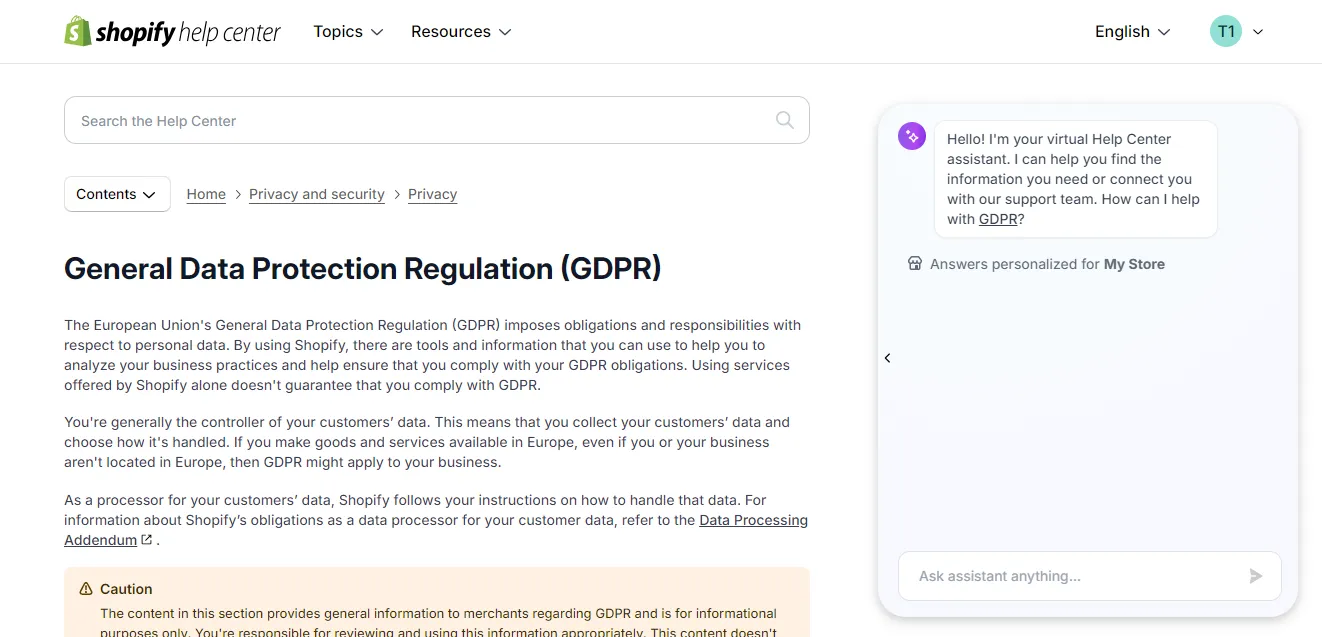
In addition to GDPR, Shopify also complies with other regional data protection laws, such as the CCPA (California Consumer Privacy Act) in the United States. Shopify provides merchants with tools to manage customer data, including options for handling data access requests, data deletion, and data portability. These features help businesses comply with the legal requirements for data protection and privacy in their respective regions.
Shopify also ensures compliance with financial regulations through its PCI DSS certification, which is mandatory for businesses that process credit card payments. PCI DSS compliance protects payment information and reduces the risk of data breaches, ensuring that merchants can process payments securely and in accordance with industry standards.
Furthermore, Shopify provides detailed documentation and resources to help merchants understand and comply with various regulations. The platform’s compliance team regularly updates these resources to reflect changes in the regulatory landscape, ensuring that merchants have access to the most current information.
BigCommerce
BigCommerce is equally committed to helping merchants comply with industry regulations and standards. The platform is designed to support businesses that operate in multiple regions, providing the tools and resources needed to adhere to various data protection laws and financial regulations.
BigCommerce ensures compliance with GDPR by providing merchants with the tools to manage customer data securely and transparently. The platform offers features for obtaining customer consent, handling data access requests, and managing data deletion and portability. BigCommerce’s GDPR compliance tools are integrated into the platform, making it easy for merchants to adhere to these regulations without needing to implement additional solutions.
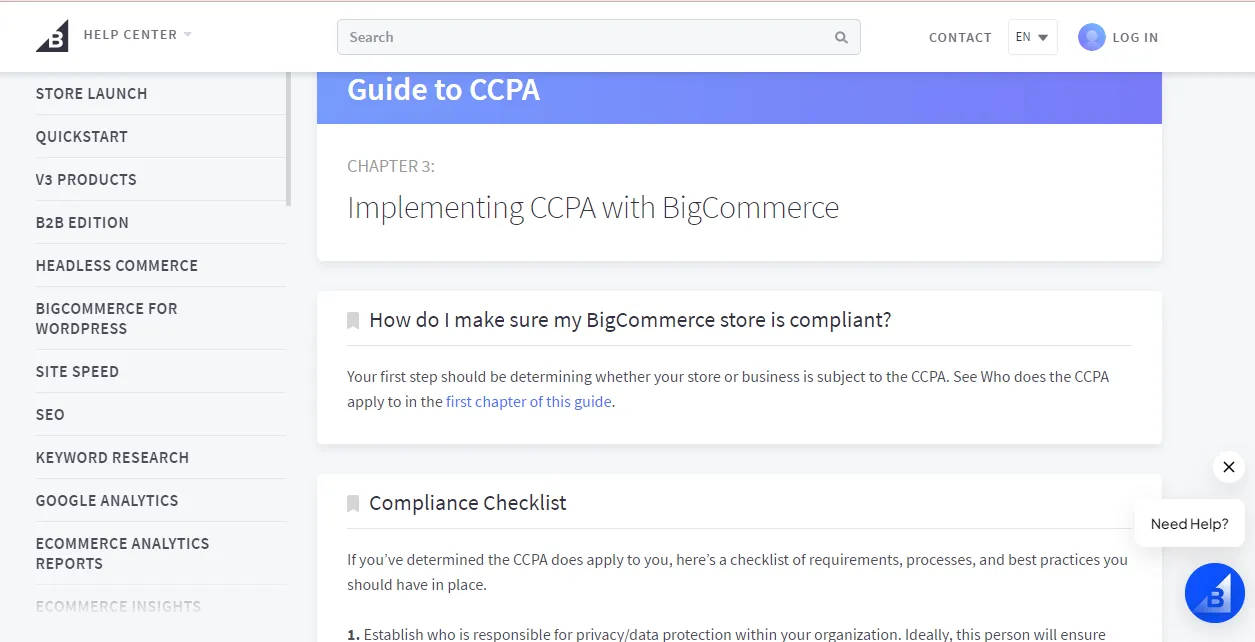
In addition to GDPR, BigCommerce also supports compliance with other regional data protection laws, such as the CCPA. The platform provides tools for managing customer data in accordance with these regulations, including options for handling data access and deletion requests. BigCommerce’s compliance features are designed to be flexible, allowing businesses to customize their data management processes to meet the specific legal requirements of their region.
BigCommerce’s commitment to compliance extends to financial regulations, with the platform being fully PCI DSS compliant. This compliance ensures that all payment data processed through BigCommerce is secure and meets the industry’s stringent security standards. PCI DSS compliance is automatically included with every BigCommerce store, providing peace of mind to merchants and customers alike.
BigCommerce also provides comprehensive documentation and resources to help merchants navigate the complex landscape of regulatory compliance. The platform’s compliance team regularly updates these resources to reflect changes in regulations, ensuring that merchants have access to the most up-to-date information and guidance.
Shopify vs BigCommerce
In the Shopify vs BigCommerce comparison for compliance and regulations, both platforms offer robust tools and resources designed to help merchants comply with industry standards and legal requirements. Shopify’s compliance features are comprehensive and built into the platform, making it easy for businesses to adhere to regulations such as GDPR and CCPA. BigCommerce offers similar compliance tools, with a strong focus on flexibility and customization, allowing businesses to tailor their data management processes to meet regional requirements. Both platforms ensure PCI DSS compliance for secure payment processing, making them equally strong in terms of financial regulation compliance. The choice between Shopify and BigCommerce will depend on specific compliance needs and the regions in which the business operates, but both platforms provide the necessary tools to ensure legal and regulatory adherence.
Shopify vs BigCommerce: Final Evaluation
As we draw closer to a decision between Shopify and BigCommerce, it’s essential to take a step back and evaluate the overall strengths and weaknesses of each platform. In this final evaluation, we’ll synthesize the key points discussed throughout this comparison, offering a clear perspective on which platform might be the better fit for your specific business needs. Whether you prioritize ease of use, advanced customization, or a robust ecosystem, this section will help you solidify your choice in the Shopify vs BigCommerce debate.
Summary
Here’s a summarized table comparing Shopify vs BigCommerce across all the key areas of the detailed comparison:
Feature Category | Shopify | BigCommerce |
Core eCommerce Features | - User-friendly product management | - Advanced product management with more customization |
Customization and Design | - Extensive theme options with easy customization | - Focused on performance with fewer theme options |
Marketing Tools | - Strong SEO tools with many apps available | - Advanced SEO with customizable URLs and built-in AMP |
Analytics and Reporting | - Comprehensive built-in analytics and customizable dashboards | - Detailed analytics with advanced segmentation options |
App Ecosystem and Integrations | - Extensive app store with over 8,000 apps | - Smaller but high-quality app marketplace with enterprise solutions |
Performance and Scalability | - Fully hosted, optimized for speed with global CDN | - Fully hosted with enterprise-grade performance and scalability |
Ease of Use and Setup | - Streamlined, beginner-friendly onboarding | - Flexible onboarding with more advanced options |
Security and Compliance | - SSL encryption, PCI DSS compliance, 2FA, fraud protection | - SSL encryption, PCI DSS compliance, 2FA, advanced security features |
This table provides a high-level summary of the key differences between Shopify and BigCommerce across various critical features, helping you to quickly compare the two platforms based on your business needs.
BigCommerce vs Shopify: Pros and Cons
When it comes to choosing an eCommerce platform, understanding the strengths and weaknesses of each option is crucial. Shopify and BigCommerce are two of the leading platforms in the market, each offering a robust set of features, tools, and capabilities designed to help businesses succeed online. However, they cater to different types of businesses and have their own unique pros and cons. In this section, we’ll dive into the advantages and disadvantages of both Shopify and BigCommerce, providing a detailed comparison to help you decide which platform is the best fit for your eCommerce needs.
Shopify
Shopify has long been recognized as one of the most popular eCommerce platforms, known for its user-friendly interface, extensive app ecosystem, and reliable customer support. It’s an excellent choice for businesses of all sizes, from small startups to large enterprises, offering a wide range of features that make it easy to set up, manage, and grow an online store. However, like any platform, Shopify has its own set of pros and cons that businesses should consider before making a decision.
Shopify Pros
Shopify’s advantages are numerous, making it a top choice for many online retailers. The platform excels in enhancing eCommerce sales features, offering a wide variety of options for customization, multi-channel selling, and inventory management. Some of the pros of Shopify include:
- Excellent for enhancing eCommerce site’s sales features.
- Numerous options available, including Shopify Plus and Advanced Shopify.
- Great backend with a wide array of plugin tools and extension options for adding functionality.
- Large community with many experts willing to assist, including Shopify Experts.
- Inventories are well-organized, making transaction management efficient.
- Great support for multi-channel selling across social networks and other platforms.
- Variety of themes and designs available.
- Excellent 24/7 customer support.
Shopify Cons
While Shopify offers many benefits, it also has some limitations that businesses should be aware of. Here are the list of cons that one should be aware of and take into consideration.
- Limited scalability options without using third-party multi-currency apps.
- Transaction fees are a concern unless using Shopify Payments.
- Website redesign is required every time you change layouts.
- Blogging features are not as robust as competitors.
- URL structures may not be ideal for SEO.
BigCommerce
BigCommerce offers a comprehensive set of tools for managing online stores, with a strong emphasis on SEO, multi-channel selling, and enterprise-level capabilities. However, like Shopify, BigCommerce has its own set of strengths and weaknesses that businesses should consider.
BigCommerce Pros
BigCommerce offers excellent features for businesses wanting to explore the eCommerce market. Known for its powerful features and scalability, BigCommerce is particularly well-suited for businesses looking to expand rapidly online. Some of the strength of BigCommerce includes:
- Many built-in options for online selling.
- No additional transaction fees for third-party gateways
- Strong SEO features to boost web ranking.
- Scalable for businesses looking to expand quickly online.
- Fantastic features for selling across multiple channels.
BigCommerce Cons
Despite its many strengths, BigCommerce does have some drawbacks that businesses should consider. Some drawbacks of BigCommerce to take into account include:
- Difficult for beginners to use, especially with technical vocabulary.
- Requires coding experience to fully utilize the platform’s technology.
- Annual sales thresholds exist; exceeding them requires paying extra fees.
- Creating multilingual shops is more challenging.
- The editing interface can be difficult for new users.
Price Comparison
This table offers a clear side-by-side comparison of Shopify vs BigCommerce pricing, covering everything from the cost of each plan to the long-term value and potential hidden costs, helping businesses make an informed decision based on their specific needs.
Pricing Aspect | Shopify | BigCommerce |
Plans | - Shopify Lite: $9/month | - Standard Plan: $39/month |
Transaction Fees | 2.9% + 30¢ (Basic), 2.6% + 30¢ (Shopify), 2.4% + 30¢ (Advanced) | No transaction fees on all plans |
Third-Party Payment Gateway Fees | 2.0% (Basic), 1.0% (Shopify), 0.5% (Advanced) | No additional fees for using third-party gateways |
Included Features | Basic: Online store, unlimited products, 24/7 support | Standard: Unlimited products, storage, bandwidth, and no transaction fees |
Advanced Features | Advanced: Custom reports, third-party calculated shipping | Pro: Google customer reviews, custom SSL, product filtering |
Sales Thresholds | No sales limits | Pro Plan has a $400k/year sales limit; additional fees if exceeded |
Premium Themes | $140 to $350 | $150 to $300 |
Additional Costs | Apps often required for advanced features | Many advanced features included in base price |
Long-Term Value | High flexibility with extensive app ecosystem | Strong value with more built-in features and no transaction fees |
Potential Hidden Costs | App costs, transaction fees for third-party gateways | Sales thresholds on Pro Plan, potential need for additional apps |
Recommendation
In this section, we provide tailored recommendations on when to choose BigCommerce over Shopify and vice versa, helping you make an informed decision that aligns with your eCommerce goals.
Choose BigCommerce when
BigCommerce stands out as a highly attractive option for businesses that prioritize avoiding transaction fees and seek more built-in functionality at a lower cost. One of the most compelling reasons to choose BigCommerce over Shopify is the absence of additional transaction fees, which can significantly reduce the overall cost of running your online store, especially for high-volume sellers. Unlike Shopify, which charges a fee for using third-party payment gateways unless you use Shopify Payments, BigCommerce allows you to keep more of your revenue, which can be a substantial advantage for businesses with tight margins.
Another critical factor is the greater value you get from BigCommerce’s basic plan compared to Shopify’s standard plan. For instance, BigCommerce’s Standard Plan includes abandoned cart recovery—a feature that is not available on Shopify until you upgrade to a more expensive plan. This feature alone can help businesses recover lost sales and increase revenue without having to invest in higher-tier plans, making BigCommerce a cost-effective choice.
BigCommerce also provides greater access to your store’s code, making it easier to customize and create unique websites. This is particularly beneficial for businesses that need highly tailored online stores or those with specific design requirements. With the ability to make more in-depth customizations, BigCommerce empowers businesses to create a distinct online presence that aligns with their brand identity.
For businesses that rely heavily on data to drive growth, BigCommerce offers cutting-edge analytics tools across all of its plans. Unlike Shopify, where advanced analytics are only available on higher-tier plans, BigCommerce provides comprehensive metrics and insights even at the entry level. These analytics can be crucial for making informed decisions about your business strategy, marketing efforts, and customer engagement, ultimately aiding in the expansion of your organization.
Another significant advantage of BigCommerce is its superior handling of product options and custom fields. BigCommerce allows for more product options and custom fields than Shopify, which is essential for businesses that offer a wide range of products with various customization options. This flexibility makes BigCommerce a better choice for sellers with complex product catalogs or those who need to offer personalized products.
Furthermore, BigCommerce makes it easier to sell globally by supporting multiple currencies out of the box, a feature that is not as seamlessly integrated into Shopify’s lower-tier plans. This capability is critical for businesses looking to expand their market reach and sell to customers worldwide, providing a smoother shopping experience for international buyers.
Additionally, BigCommerce offers better real-time carrier rate quotes for shipping, which can significantly enhance the customer experience. While Shopify does provide this feature, it is only available on the Advanced Shopify plan, which costs $399 per month. In contrast, BigCommerce offers this functionality at a lower price point, making it an excellent option for businesses that need accurate shipping rates without the high costs associated with Shopify.
Choose Shopify when
On the other hand, Shopify shines as the preferred platform for businesses seeking a more user-friendly and aesthetically versatile solution. If your primary concern is gaining access to abandoned cart recovery at a lower pricing tier, Shopify is the better option. Shopify includes this feature in its Basic Shopify plan, which is more affordable than BigCommerce’s Plus Plan. This can be particularly advantageous for small businesses or startups that need to maximize their budget while still taking advantage of crucial features like abandoned cart recovery.
For those on a tight budget or just starting out, Shopify Lite is a highly attractive option. At just $9 per month, Shopify Lite allows you to add eCommerce functionality to an existing website or blog, making it possible to start selling online without the need to invest in a full-fledged online store. This option is ideal for entrepreneurs who are just dipping their toes into eCommerce or for businesses that already have a website but want to add eCommerce capabilities.
Shopify also excels in providing a broader range of typefaces and superior layouts, offering more tools to create a visually stunning website. The premium themes available on Shopify are often considered more polished and modern compared to those offered by BigCommerce, giving businesses more flexibility to create a unique and professional-looking online store. If design and aesthetics are a top priority for your brand, Shopify’s extensive theme library and design tools make it the ideal choice.
In addition to design, Shopify’s mobile app is more robust, offering additional features that cater to entrepreneurs on the move. This can be a significant advantage for business owners who need to manage their store while traveling or for those who want to stay connected to their business operations at all times. The mobile app’s functionality includes order management, product updates, and even some marketing tasks, making it a powerful tool for busy entrepreneurs.
Moreover, Shopify offers built-in email marketing capabilities that do not require additional integrations. This can save time and reduce costs, as you can manage your email marketing campaigns directly within Shopify without needing to rely on third-party apps or services. This feature is particularly beneficial for small businesses that want to streamline their marketing efforts and keep everything within one platform.
Shopify’s backend experience is also simpler and more comprehensive, with excellent product categorization and a vast range of third-party apps to choose from. This makes it easier to manage your products, track inventory, and customize your store’s functionality to meet your specific needs. Additionally, Shopify’s ability to handle various tax rates and comply with VAT MOSS regulations is a significant benefit for businesses operating in regions with complex tax requirements.
For businesses with a physical presence, Shopify offers a variety of POS (Point of Sale) options directly from the company, rather than relying on third-party providers. Shopify’s POS tools are fully integrated with the online store, providing a seamless experience for managing both online and offline sales. This is particularly useful for businesses that operate in multiple channels and need a unified system for tracking sales and inventory across different platforms.
Conclusion
So, between BigCommerce vs Shopify, who has won? The good news is that deciding between Shopify and BigCommerce truly can’t go wrong. Both systems have comparable costs and functionality. The devil, though, is in the details, and it all relies on how you want all those elements to be provided.
Shopify’s more developed third-party ecosystem is a significant advantage, providing access to a vast network of freelancers, developers, and designers who specialize in Shopify. This extensive support network, coupled with its user-friendly interface, makes Shopify an excellent choice for beginners and those launching an online business for the first time. The platform’s simplicity, combined with a wide array of apps and integrations, ensures that you can expand your store’s functionality as your business grows.
On the other hand, BigCommerce offers advanced capabilities right out of the box, making it a strong contender for businesses that prefer built-in features without the need for additional app purchases. BigCommerce’s superior customization options, along with its unlimited product listings and strong integrations, make it an ideal choice for users who want to tailor their store to meet specific needs without extensive reliance on third-party apps.
BigCommerce and Shopify have been pitted against each other for many years now. with both platforms offering distinct strengths. BigCommerce emerges as a more comprehensive solution for those who need advanced features and customization without much additional effort. However, Shopify’s ease of use, combined with its extensive ecosystem, makes it a formidable option, particularly for those who are new to eCommerce.
Ultimately, the choice between Shopify vs BigCommerce comes down to your unique business requirements. It’s crucial to evaluate each platform based on your particular scenario, considering factors like ease of use, customization needs, and the level of support you might require. With thorough research and careful consideration, you’ll be well-equipped to choose the platform that best fits your store’s needs.
If you need assistance with developing your Shopify store, our team of Shopify experts is ready to help. Don’t hesitate to reach out for tailored support and services that can help you maximize your online business potential.






